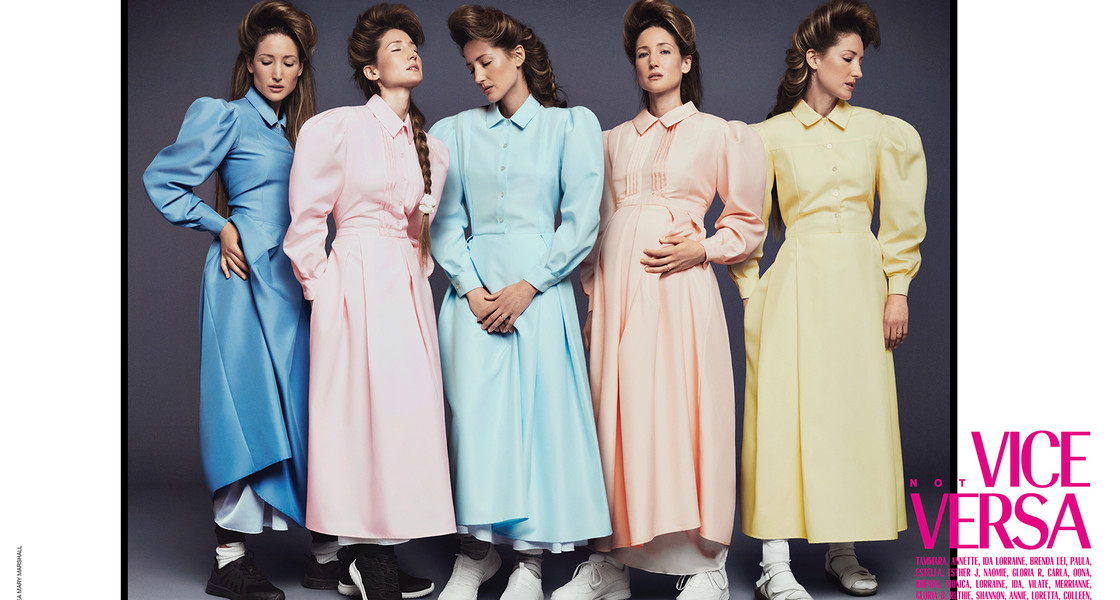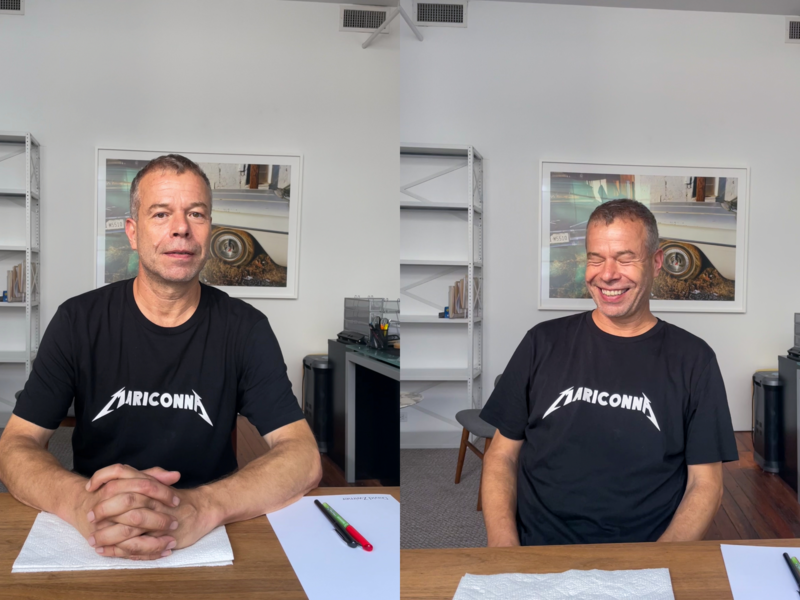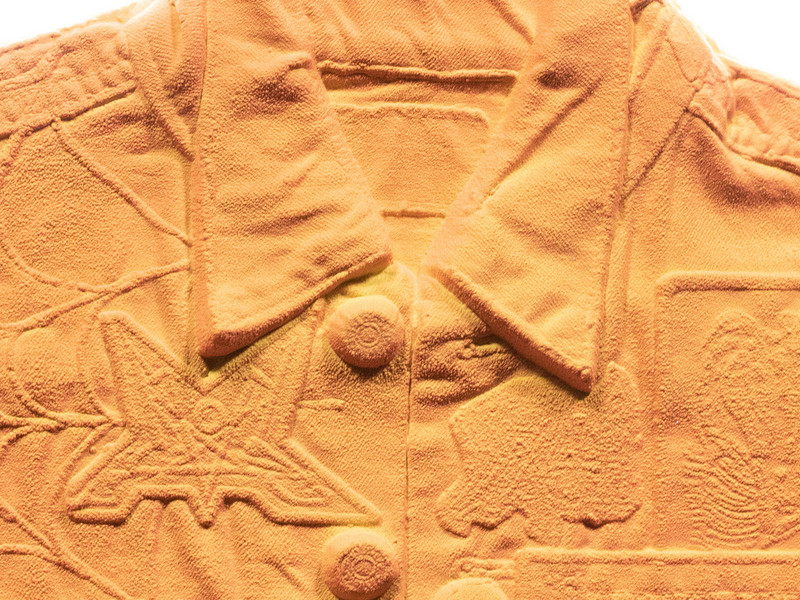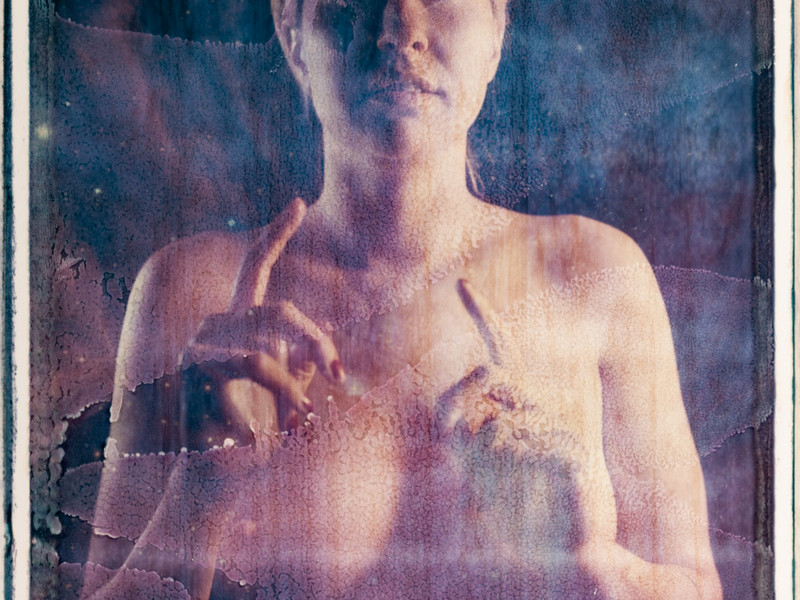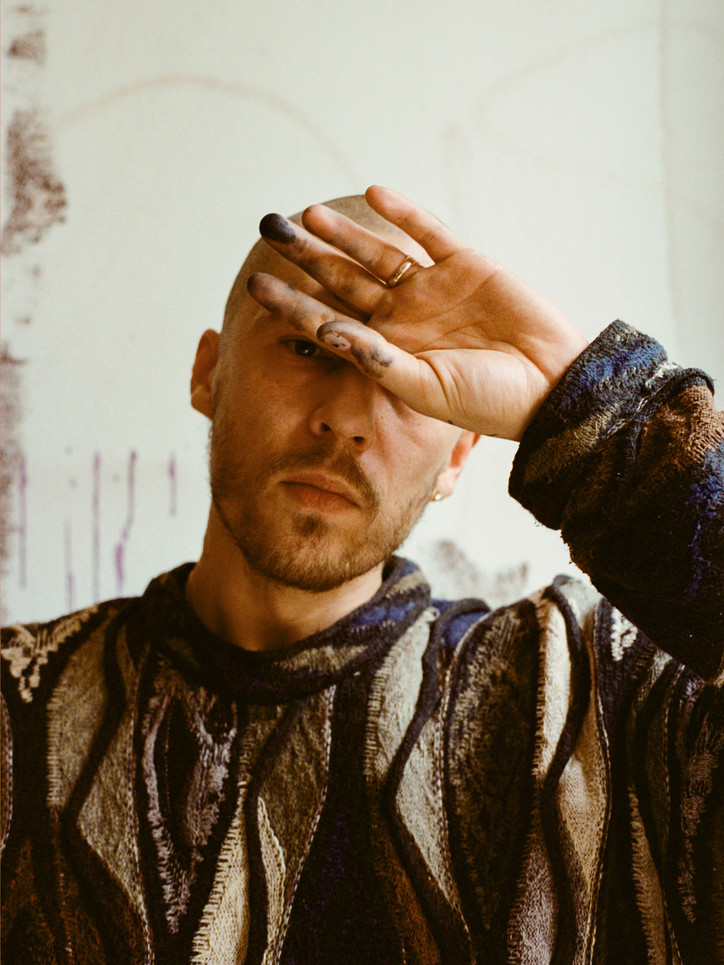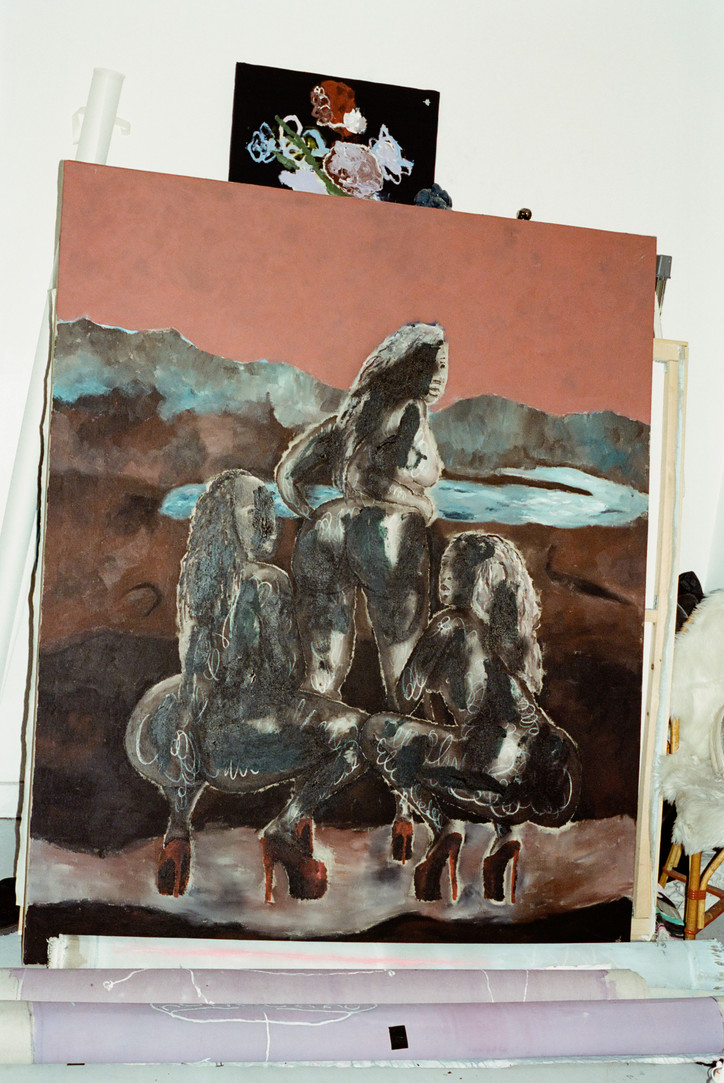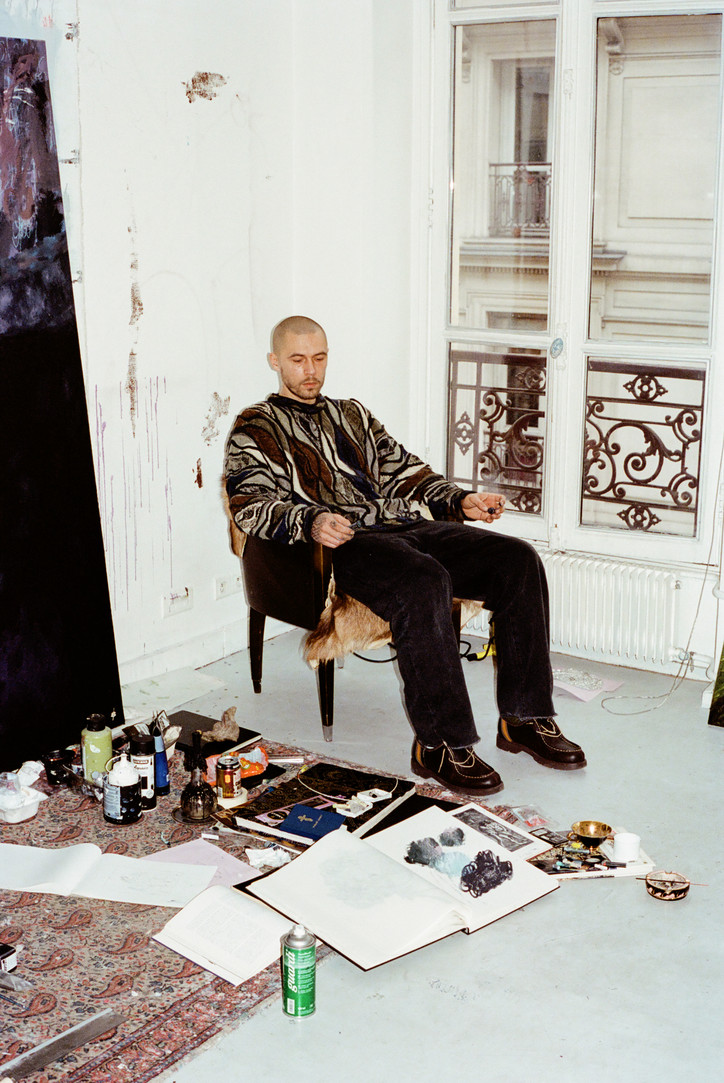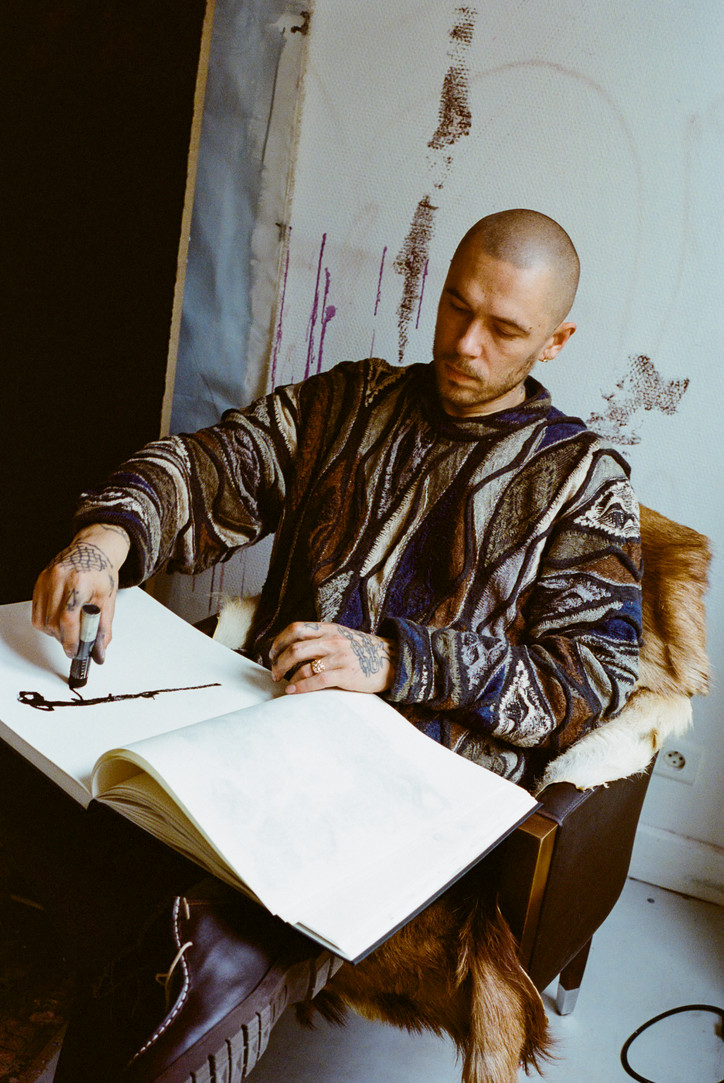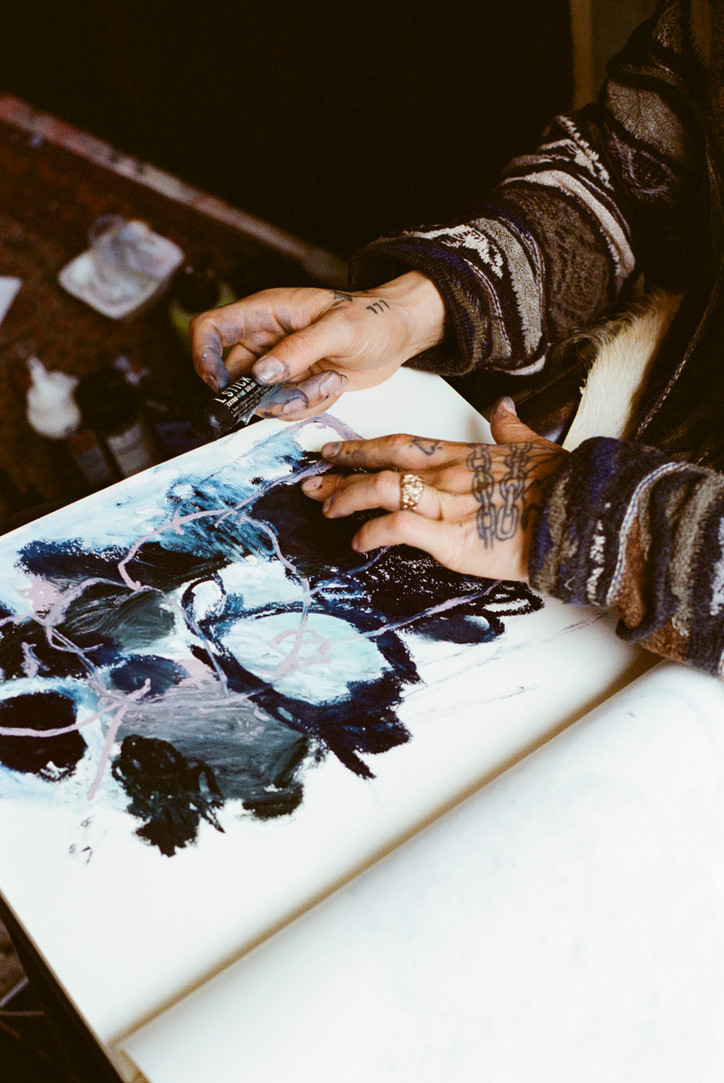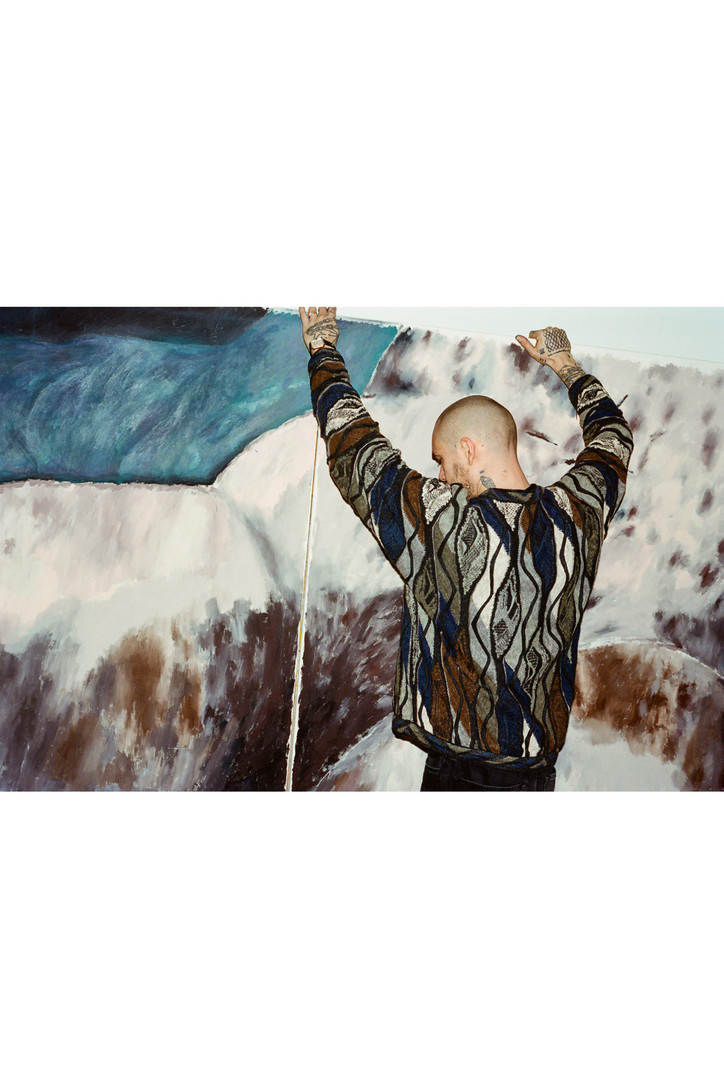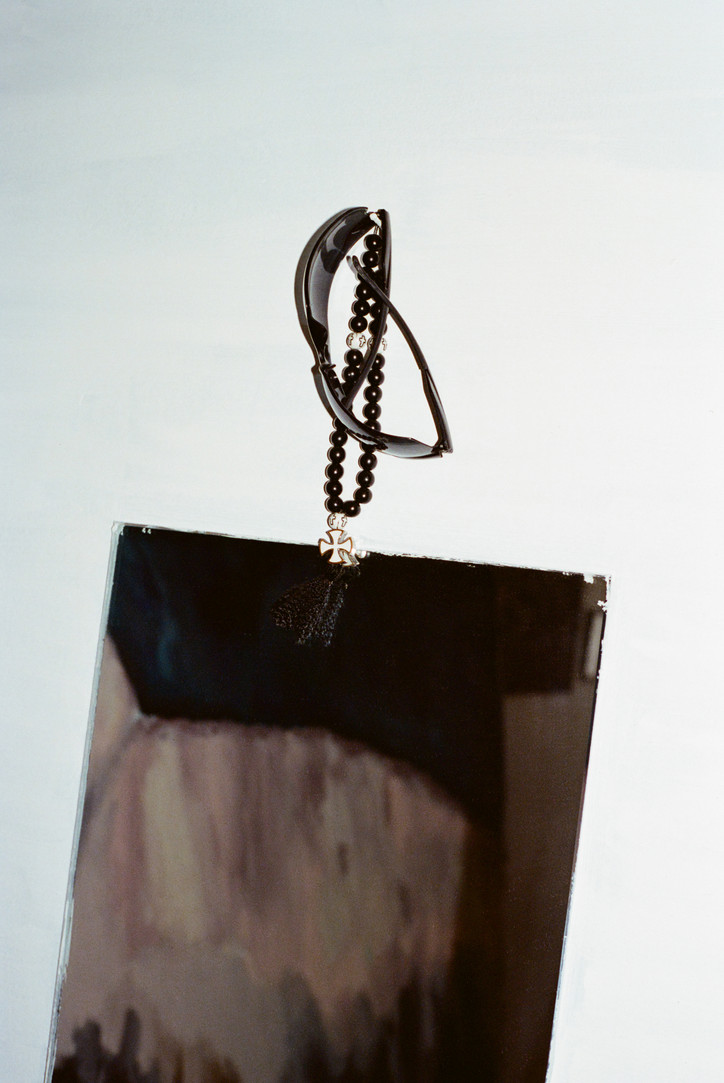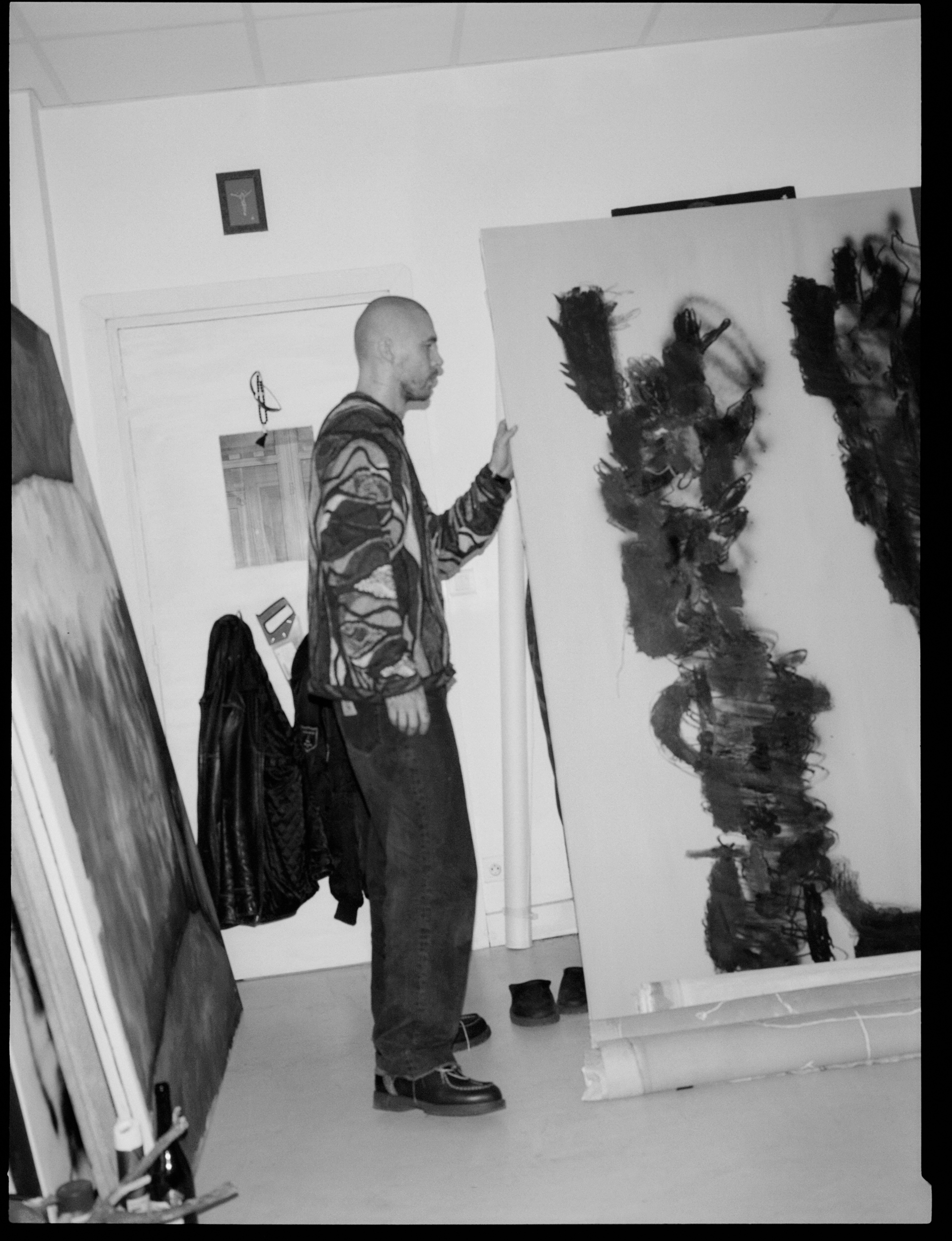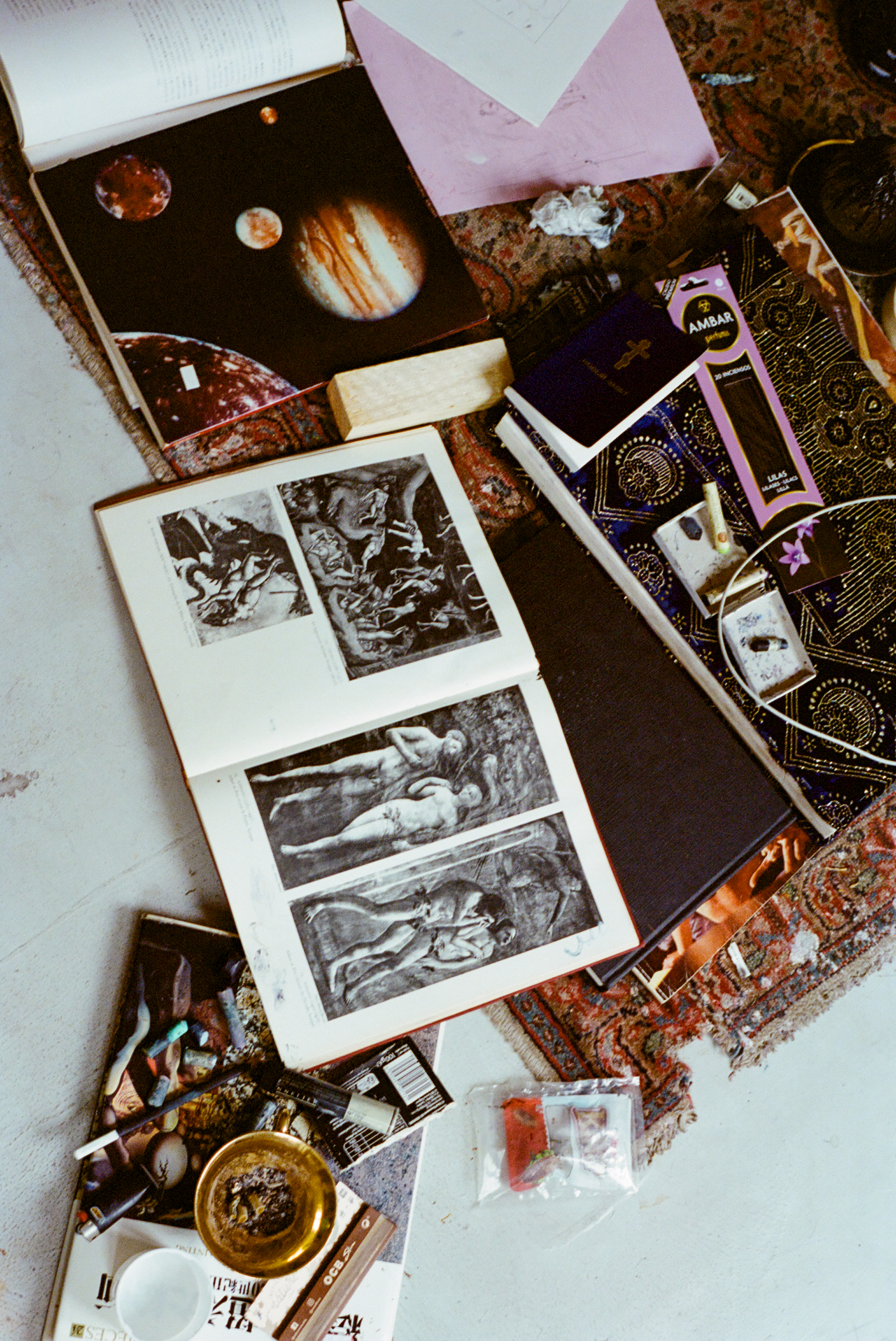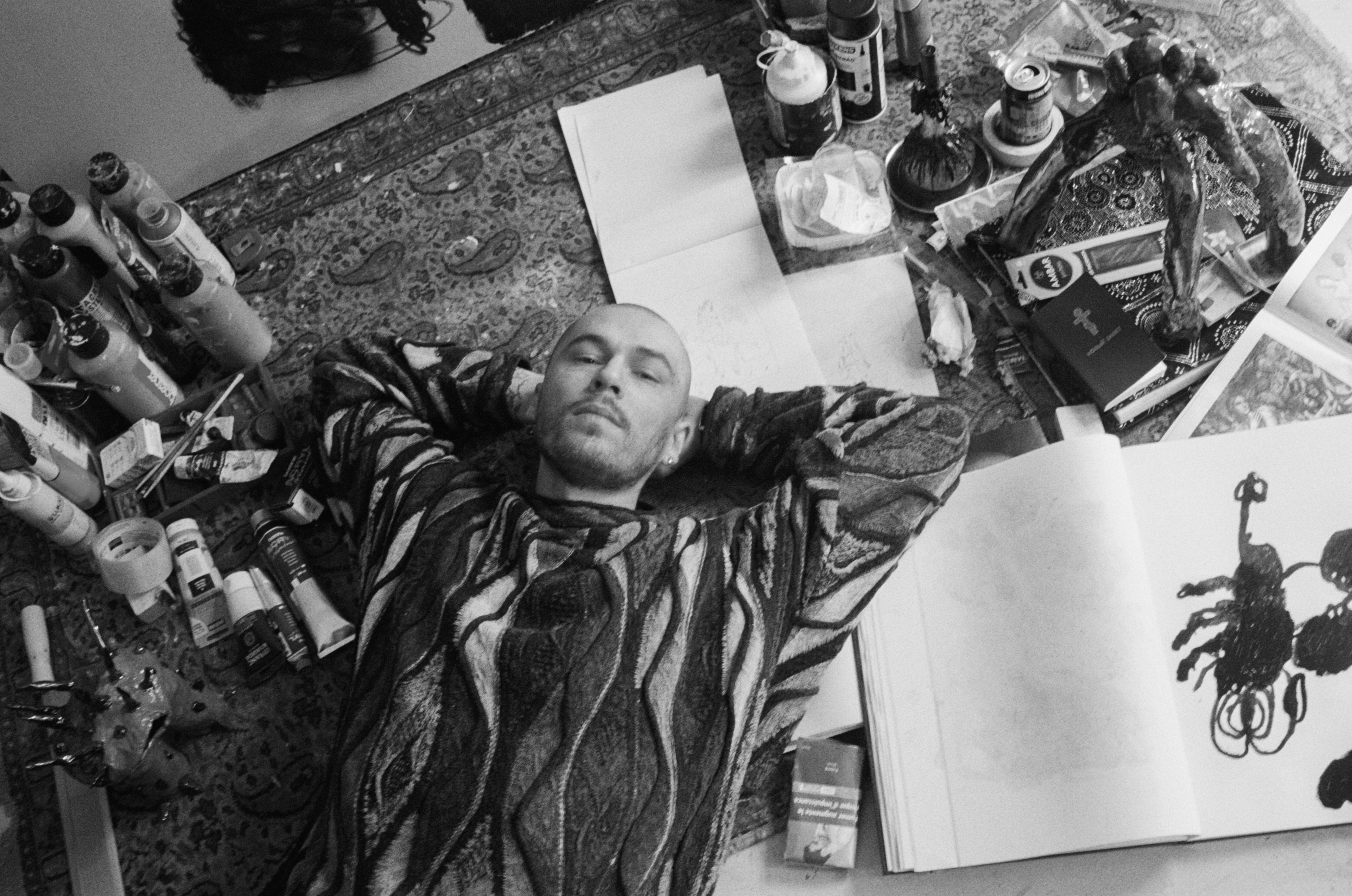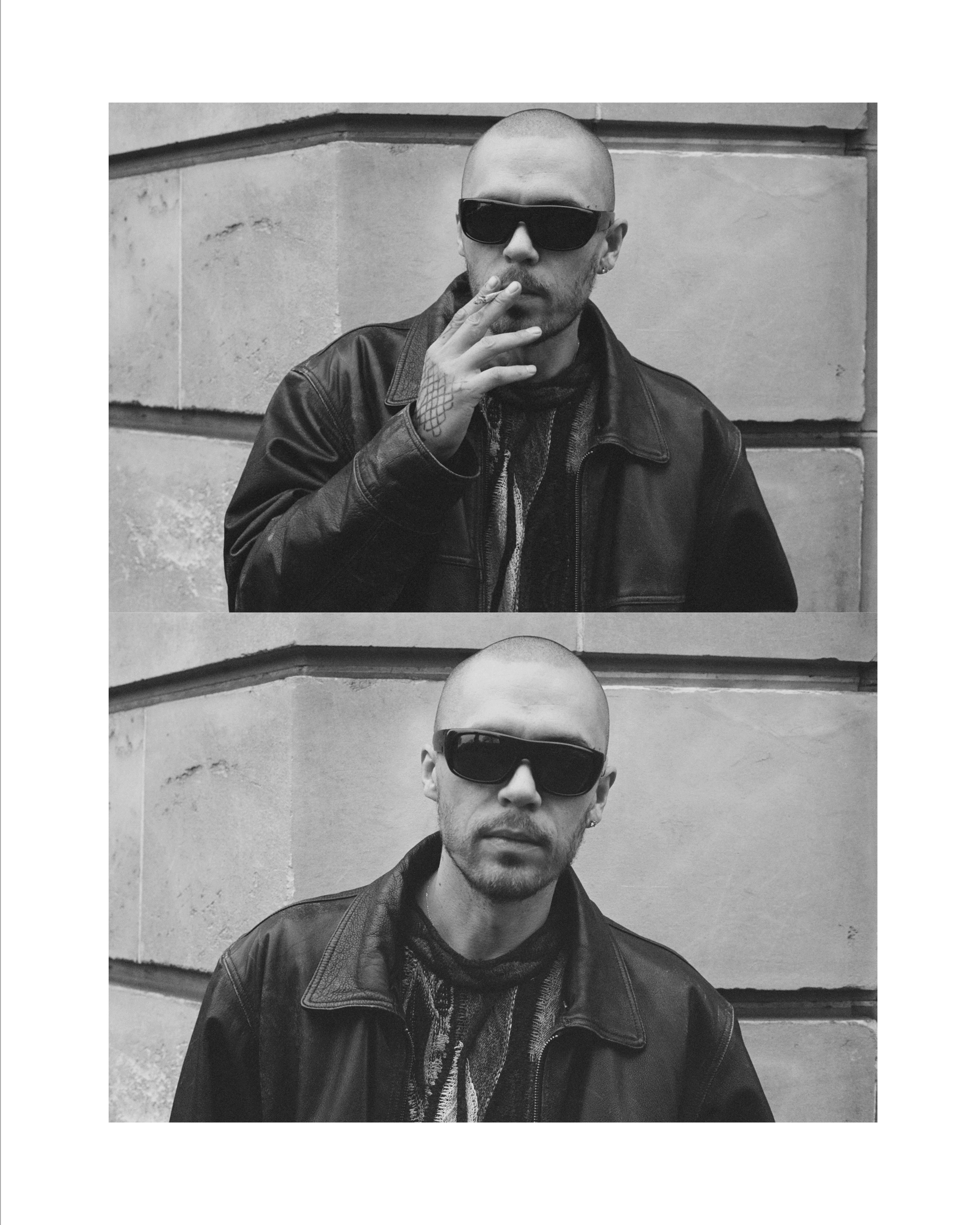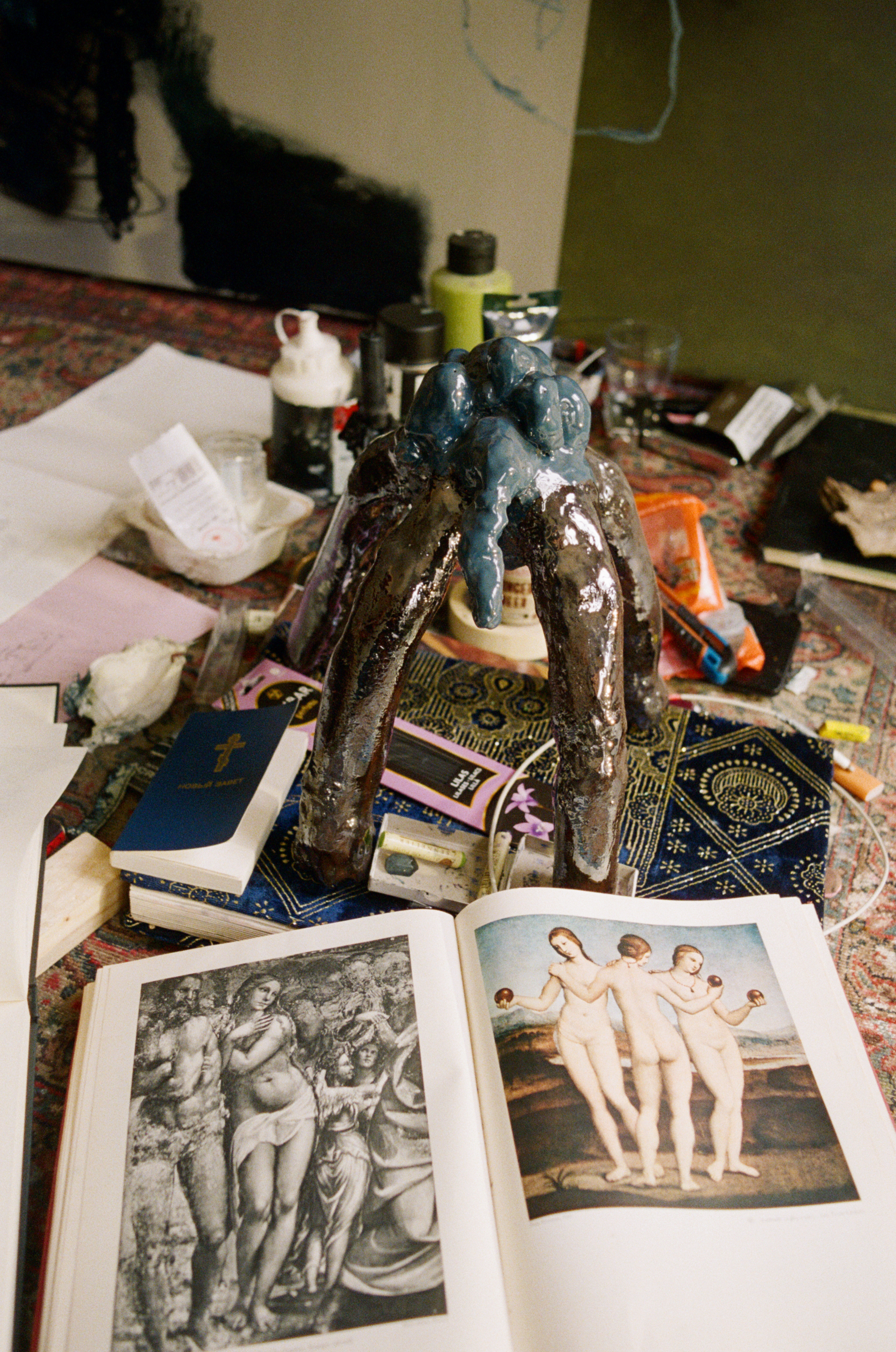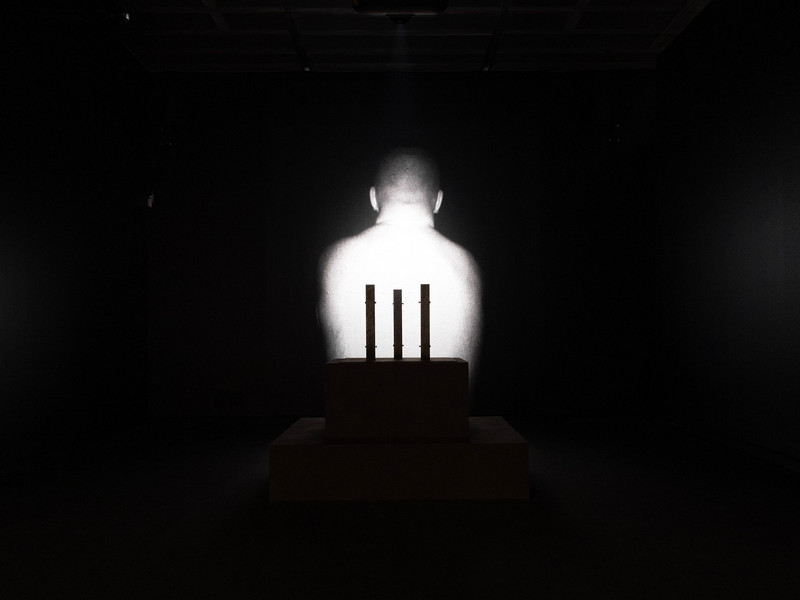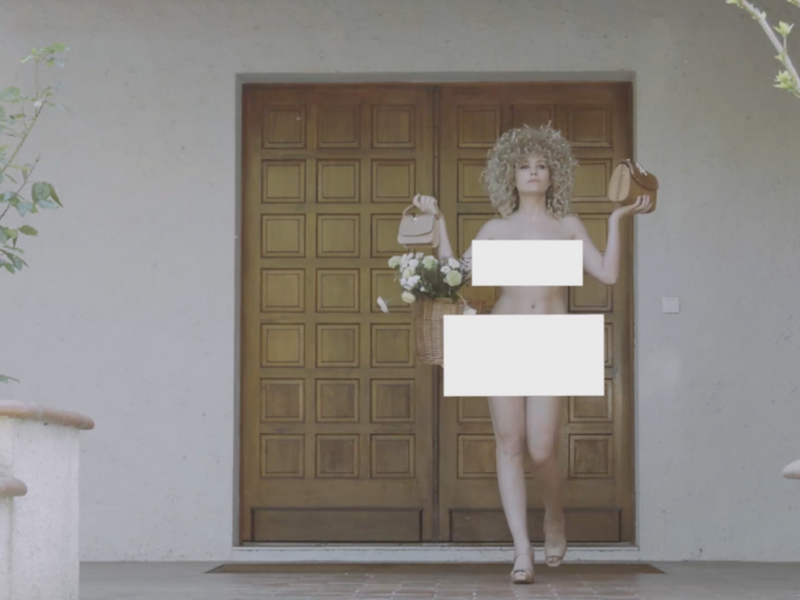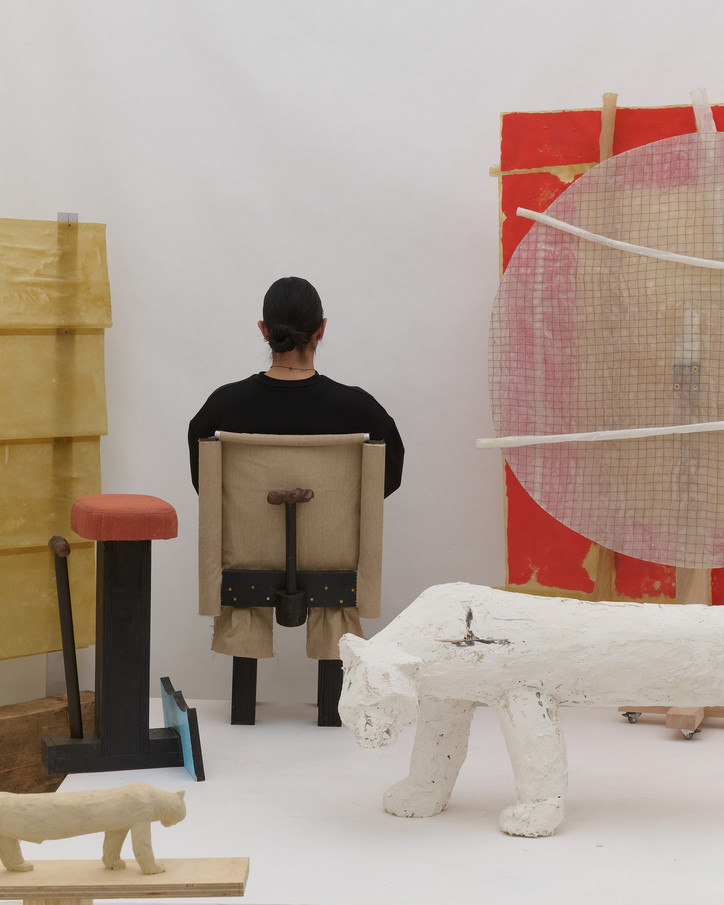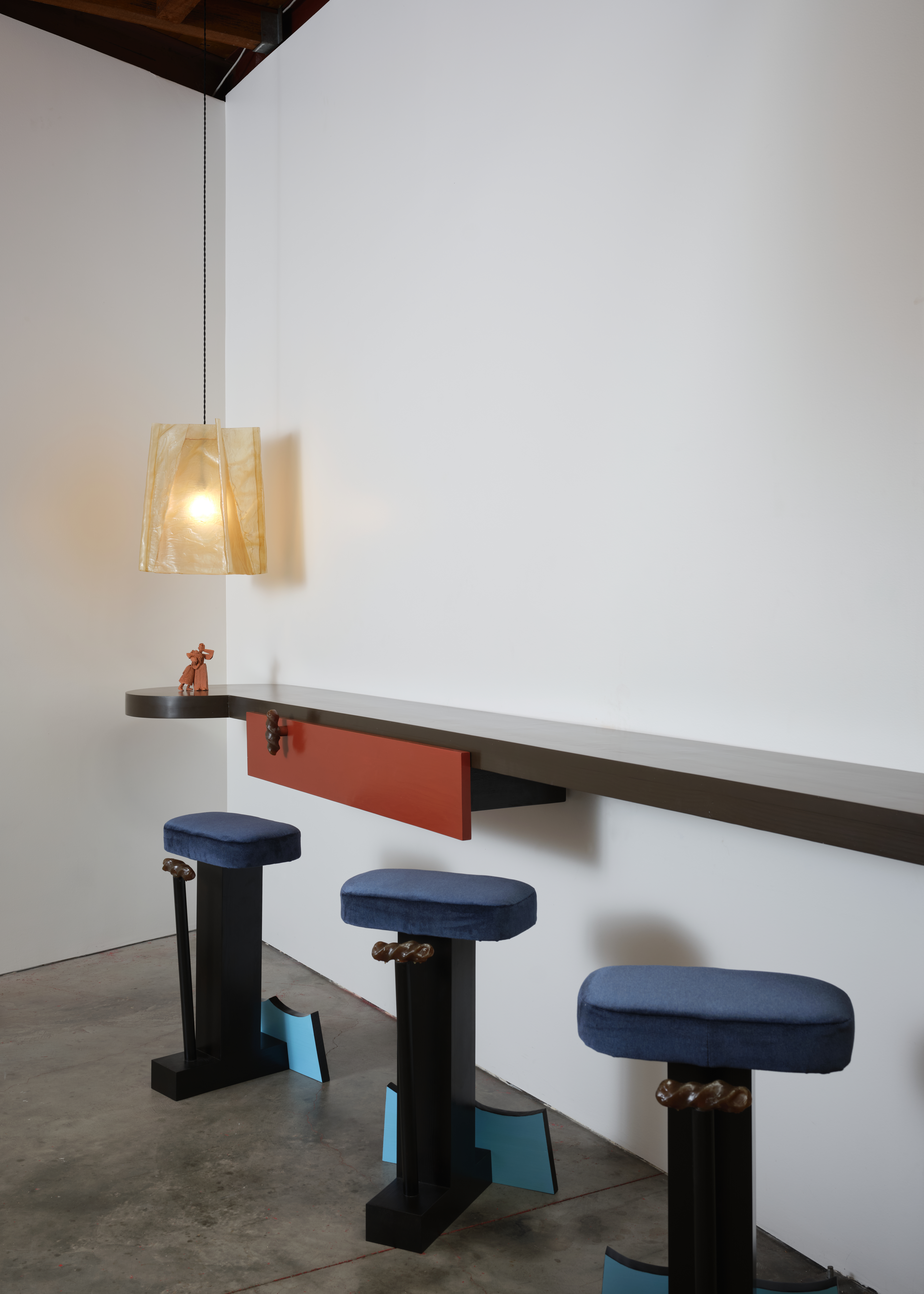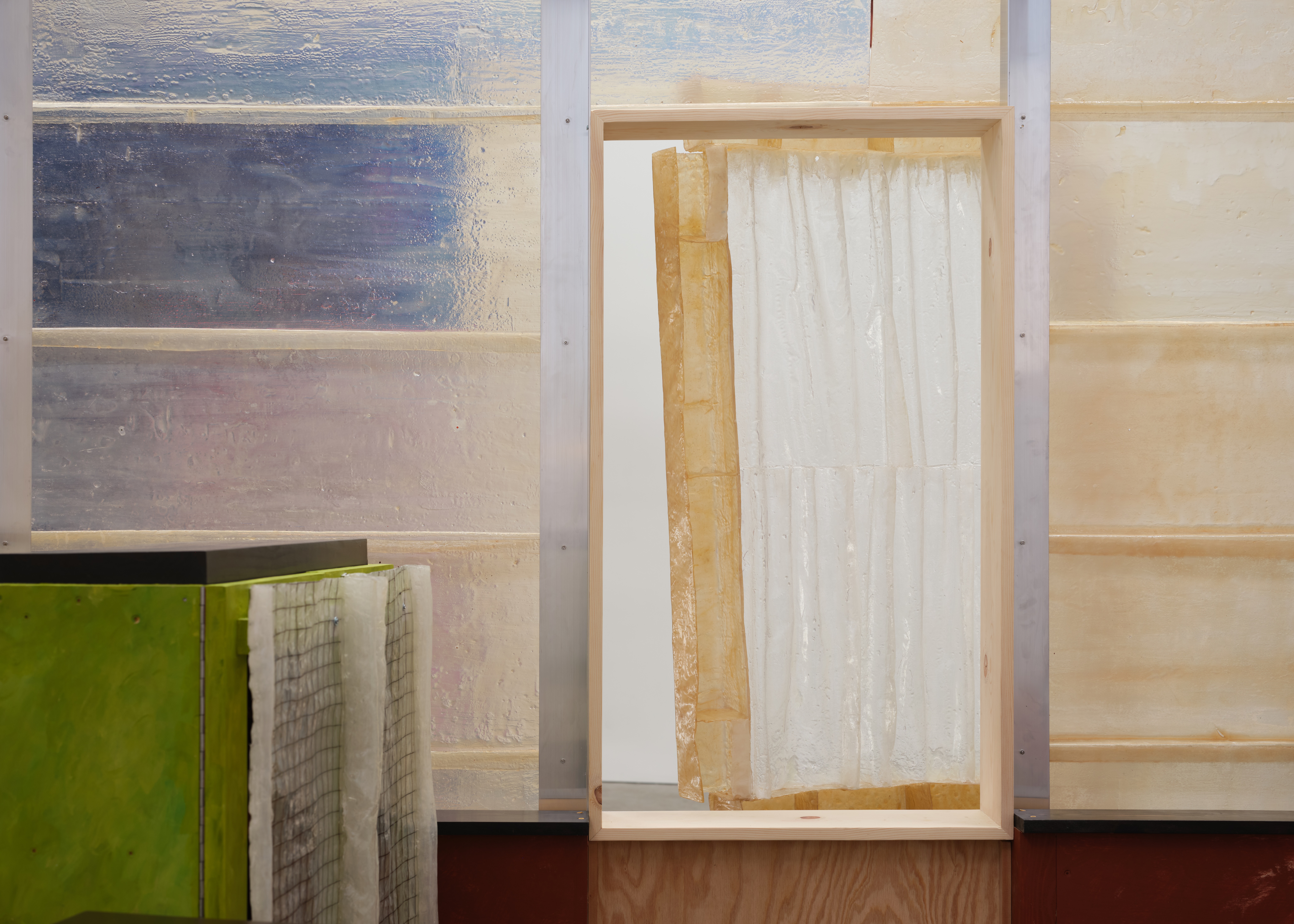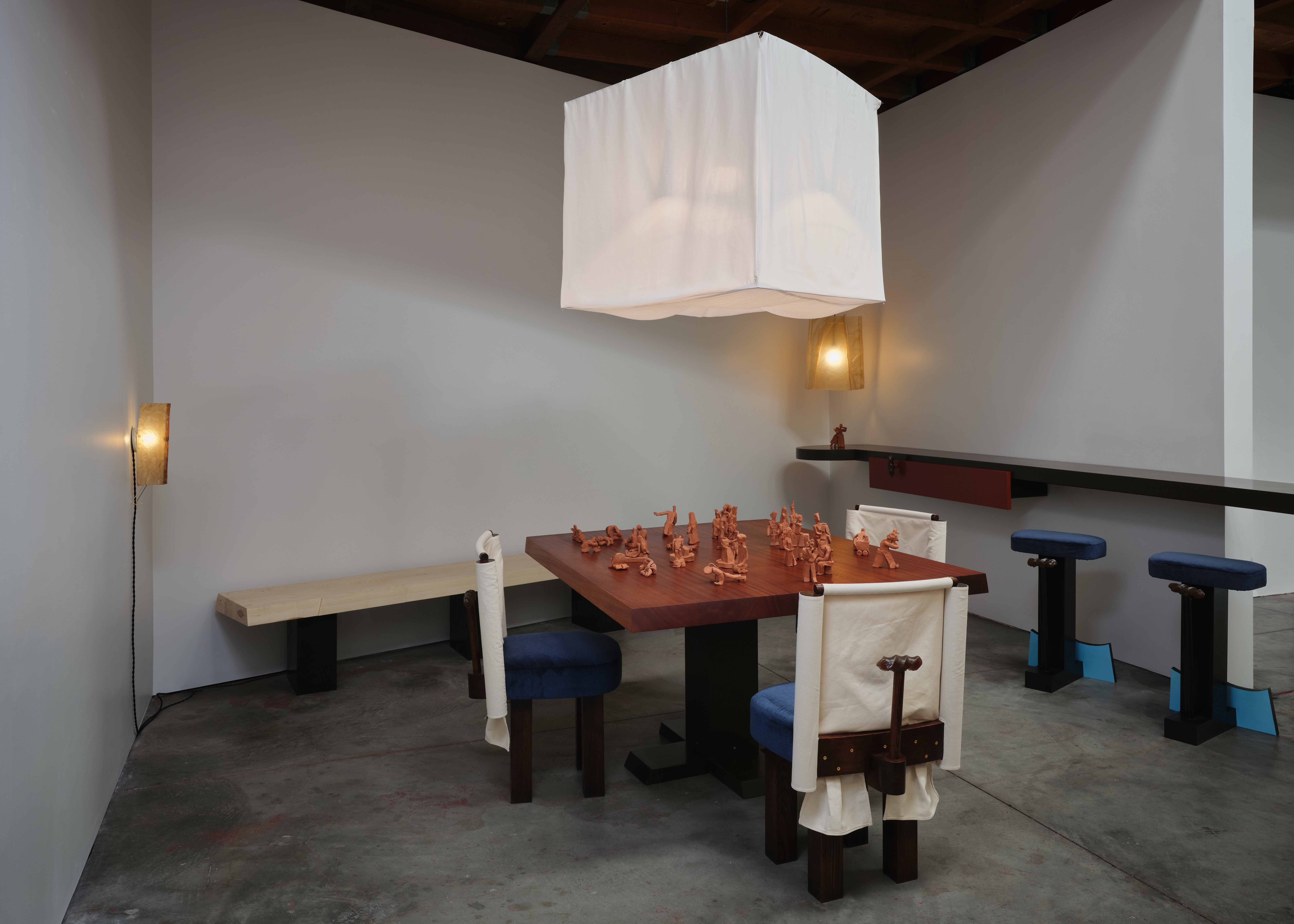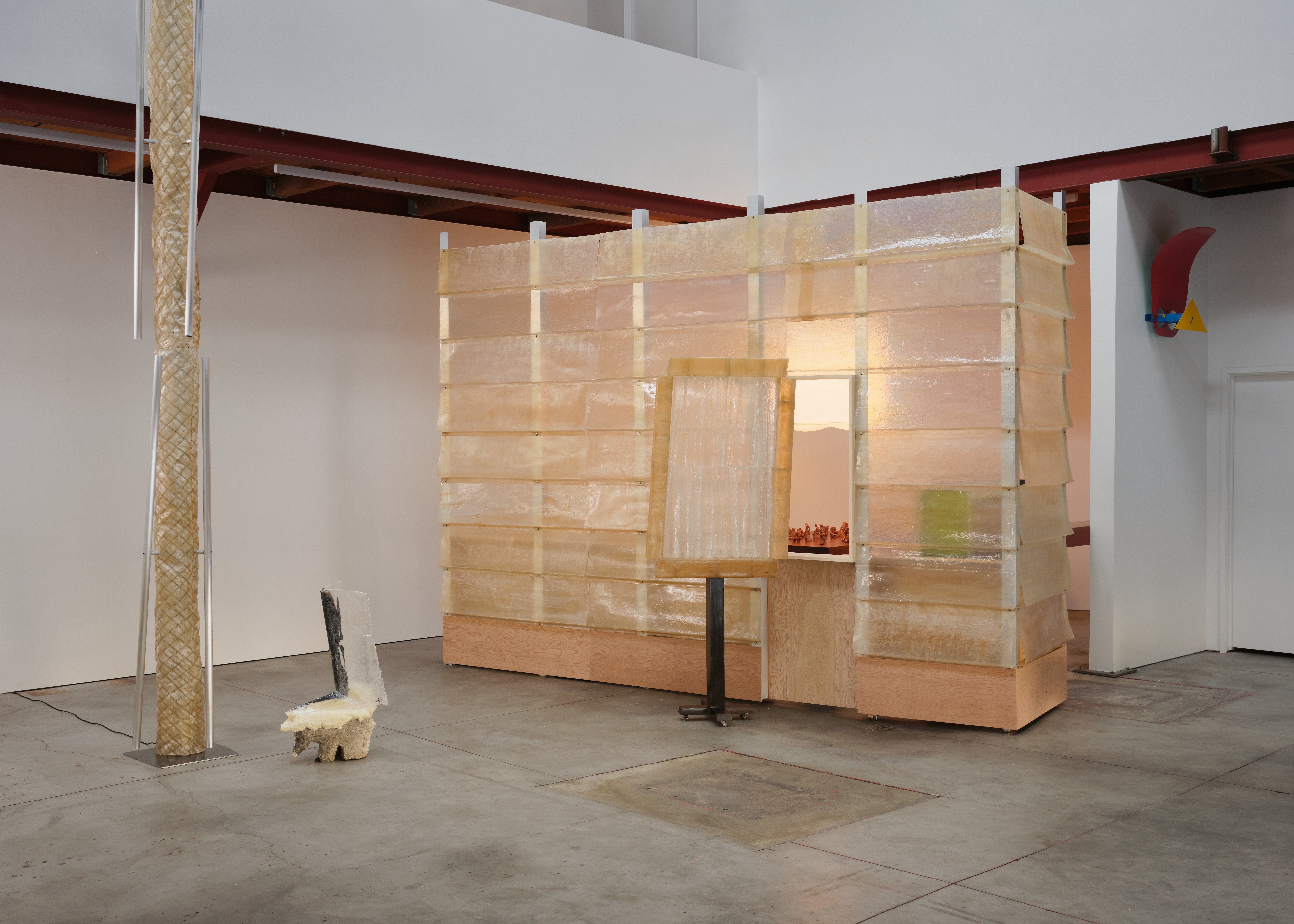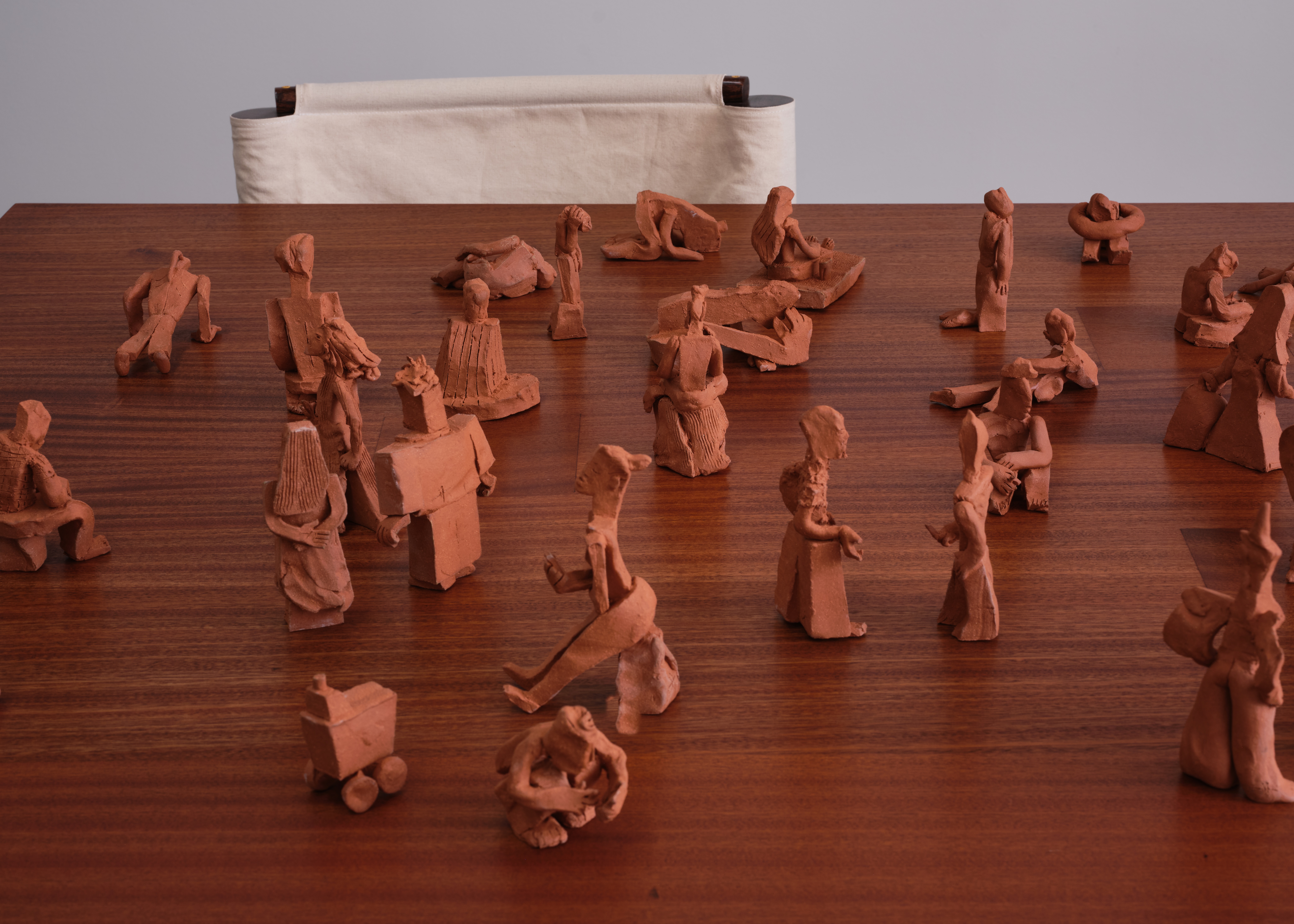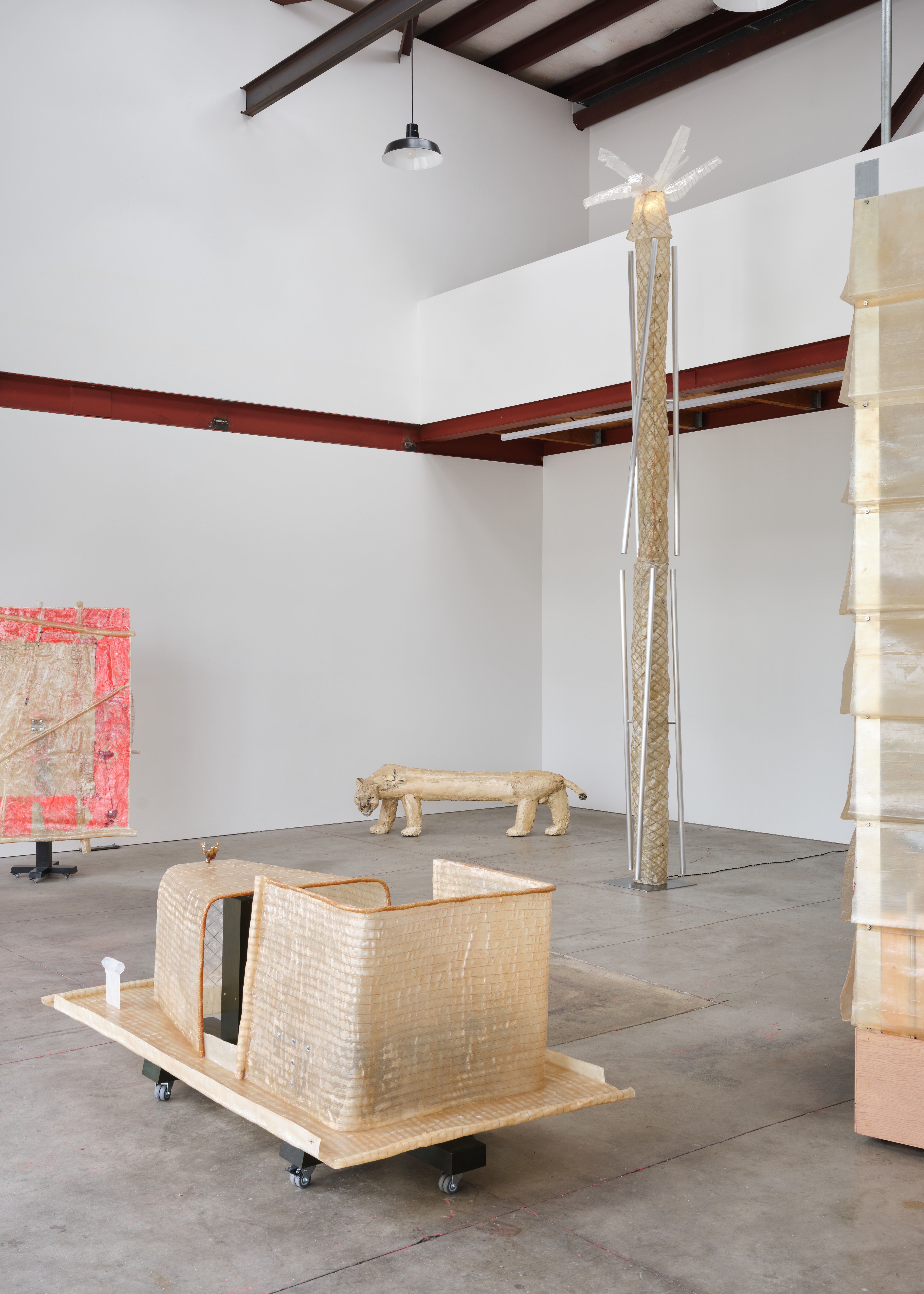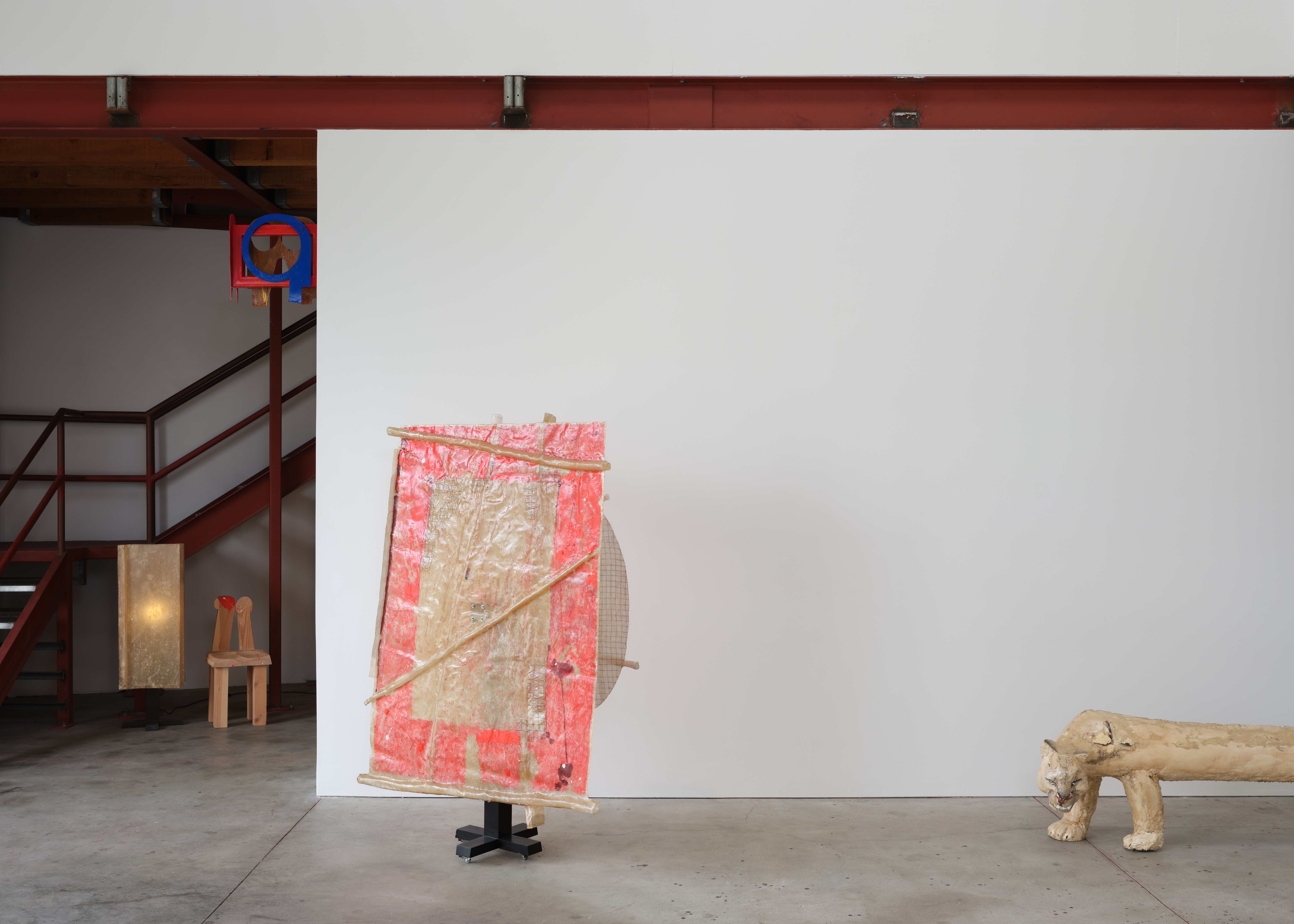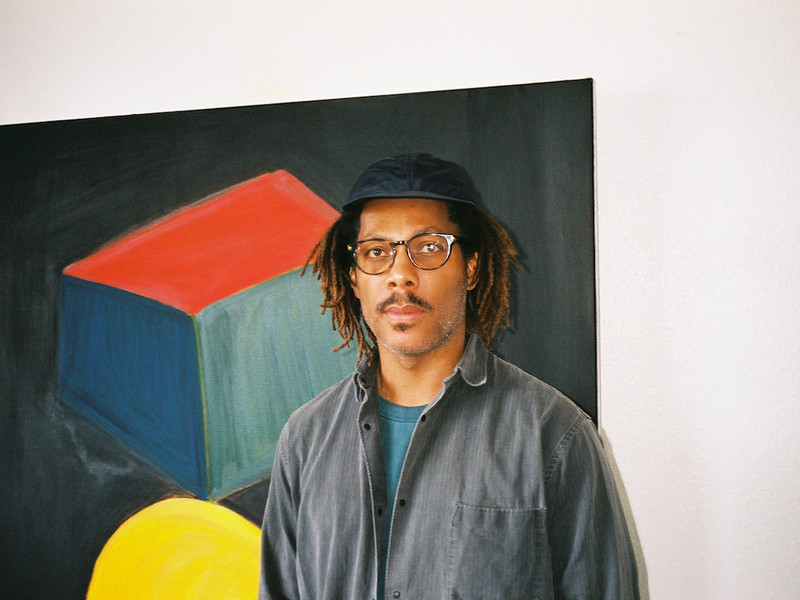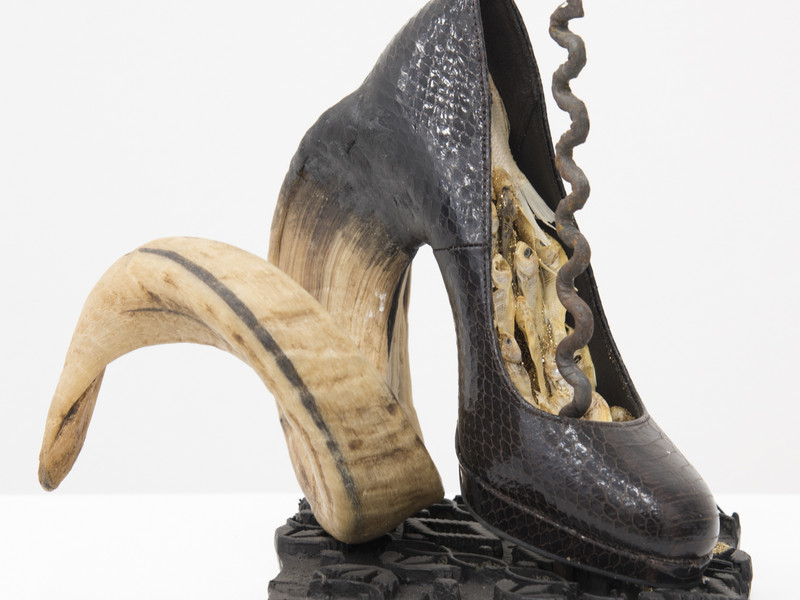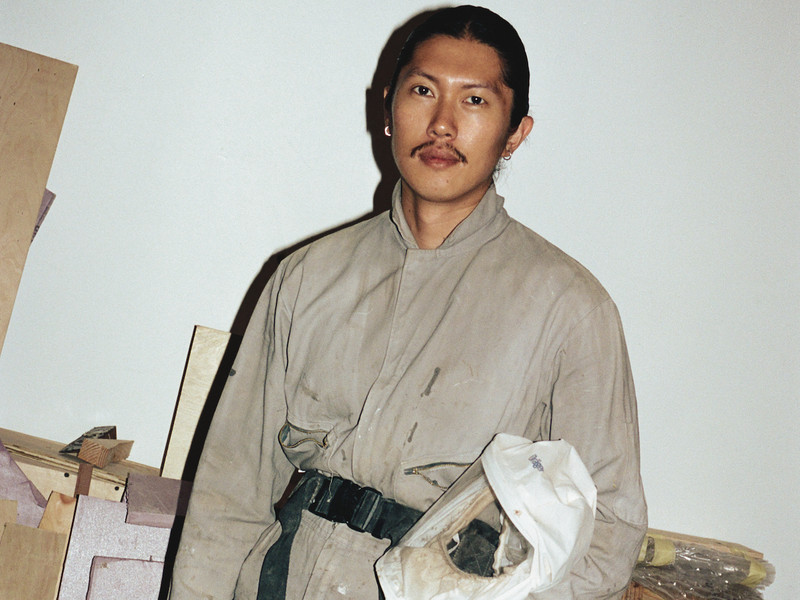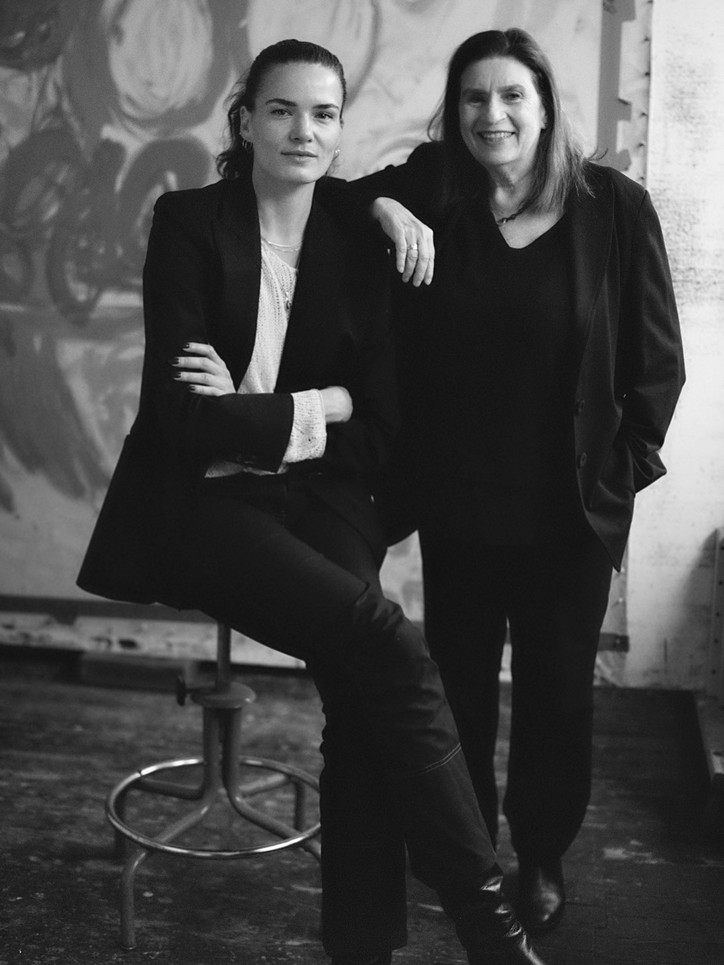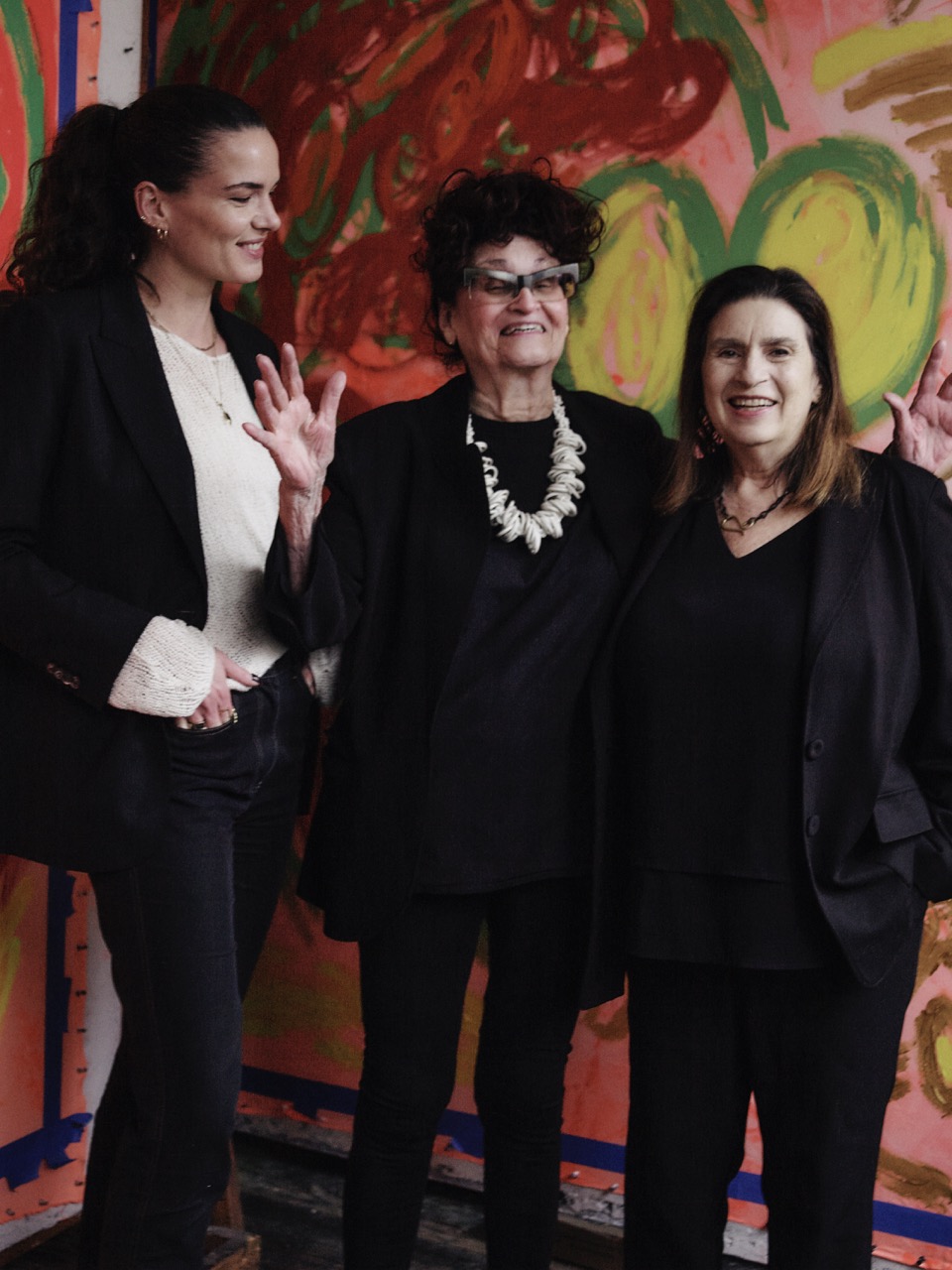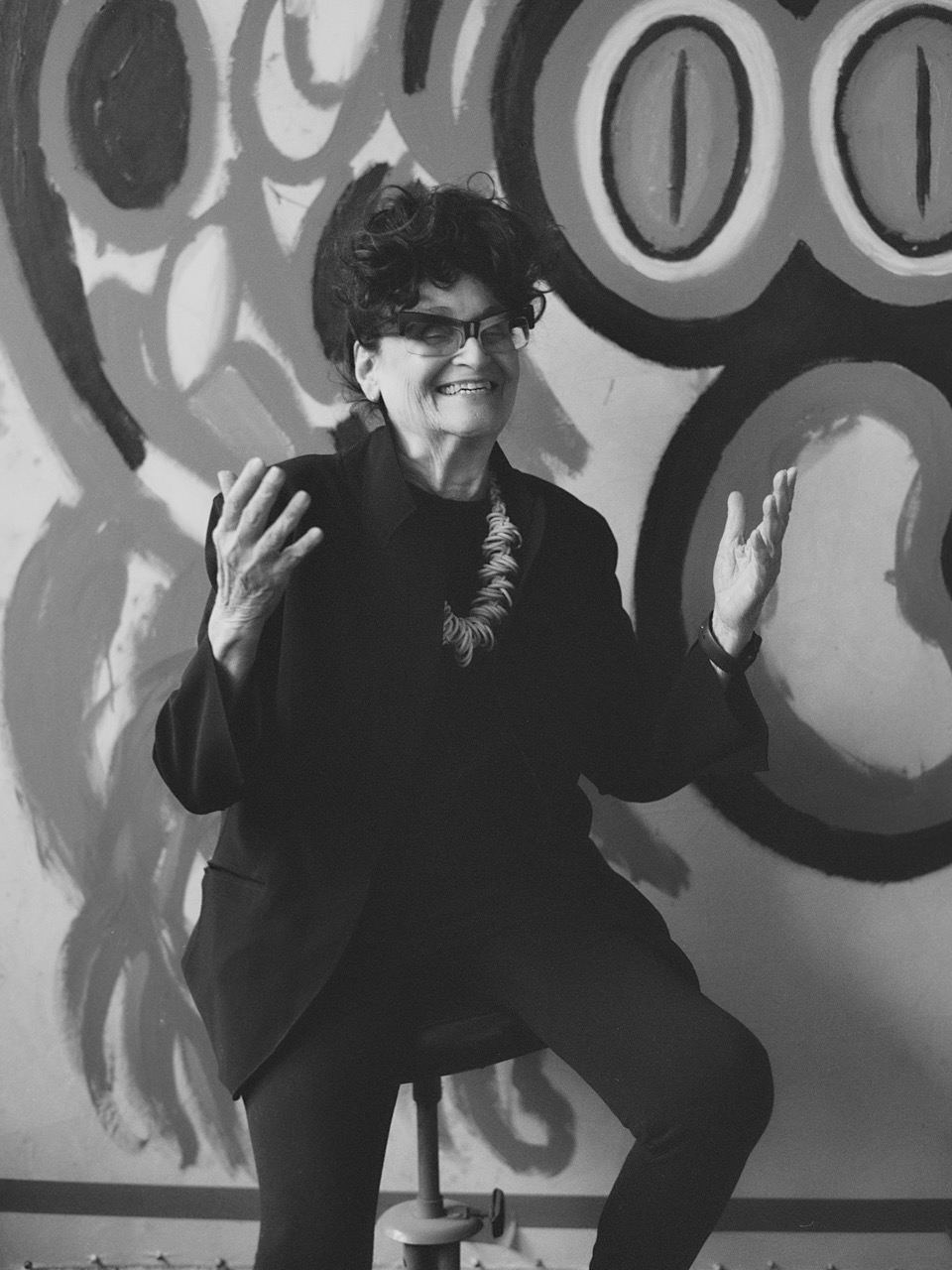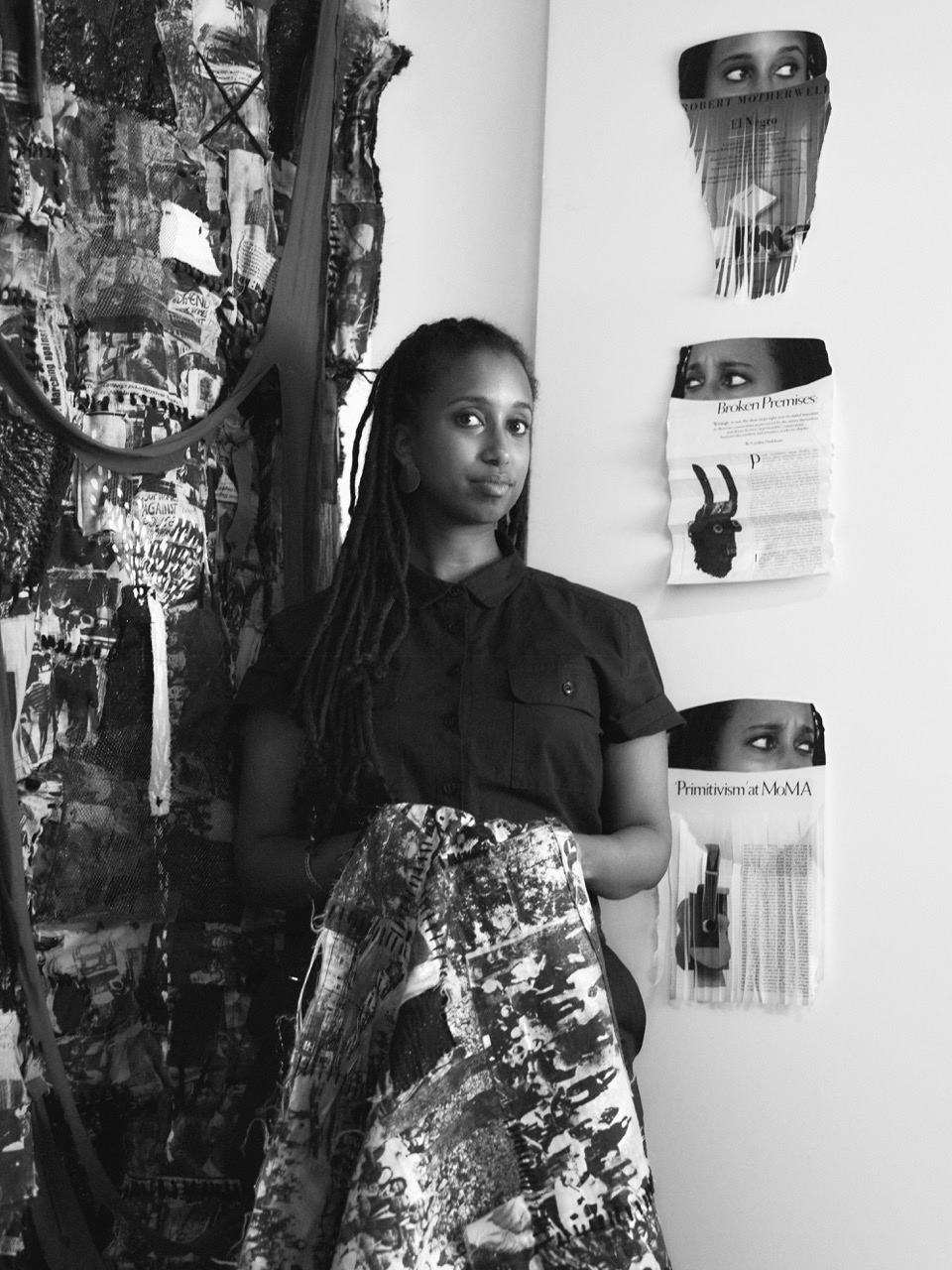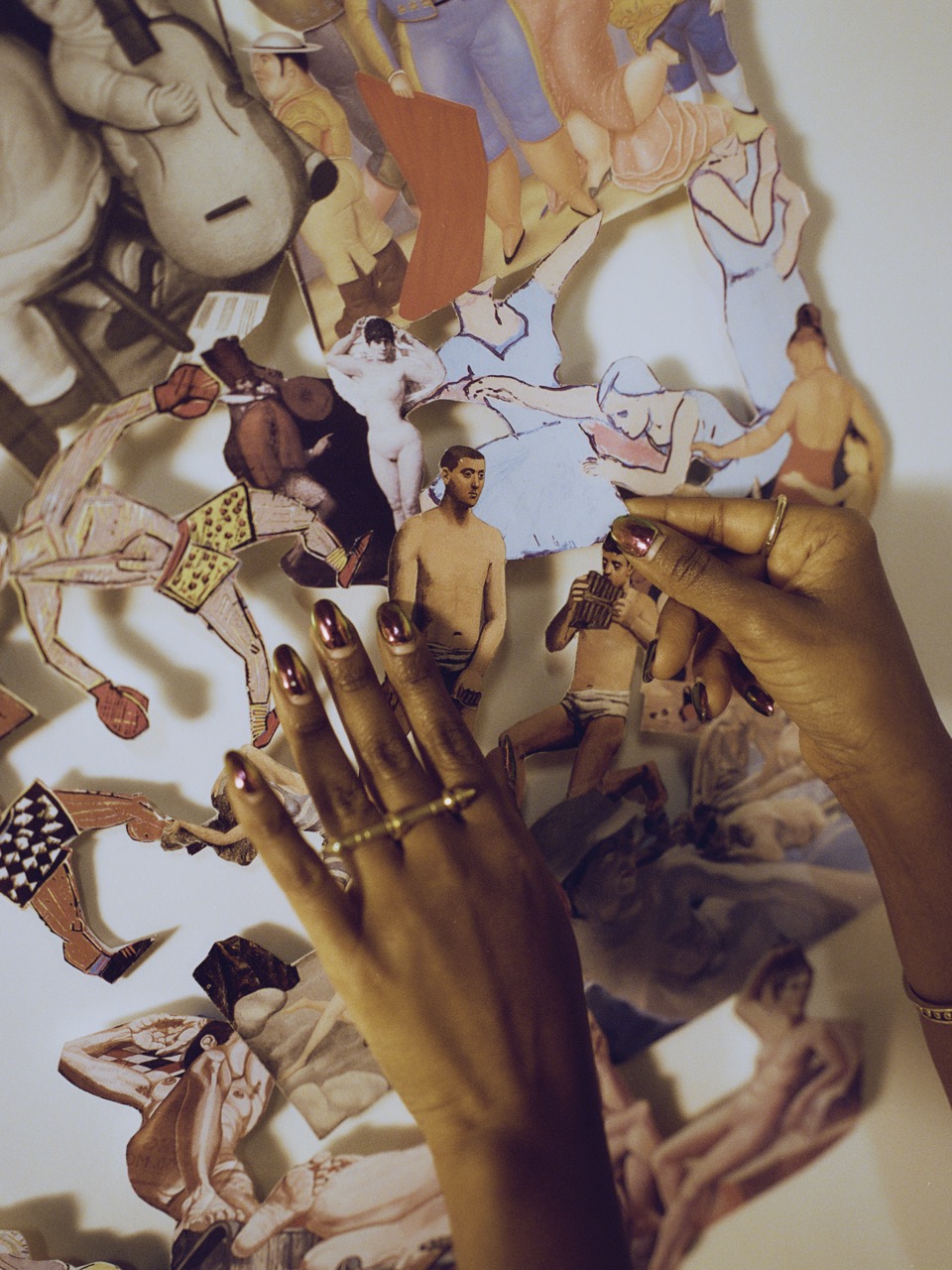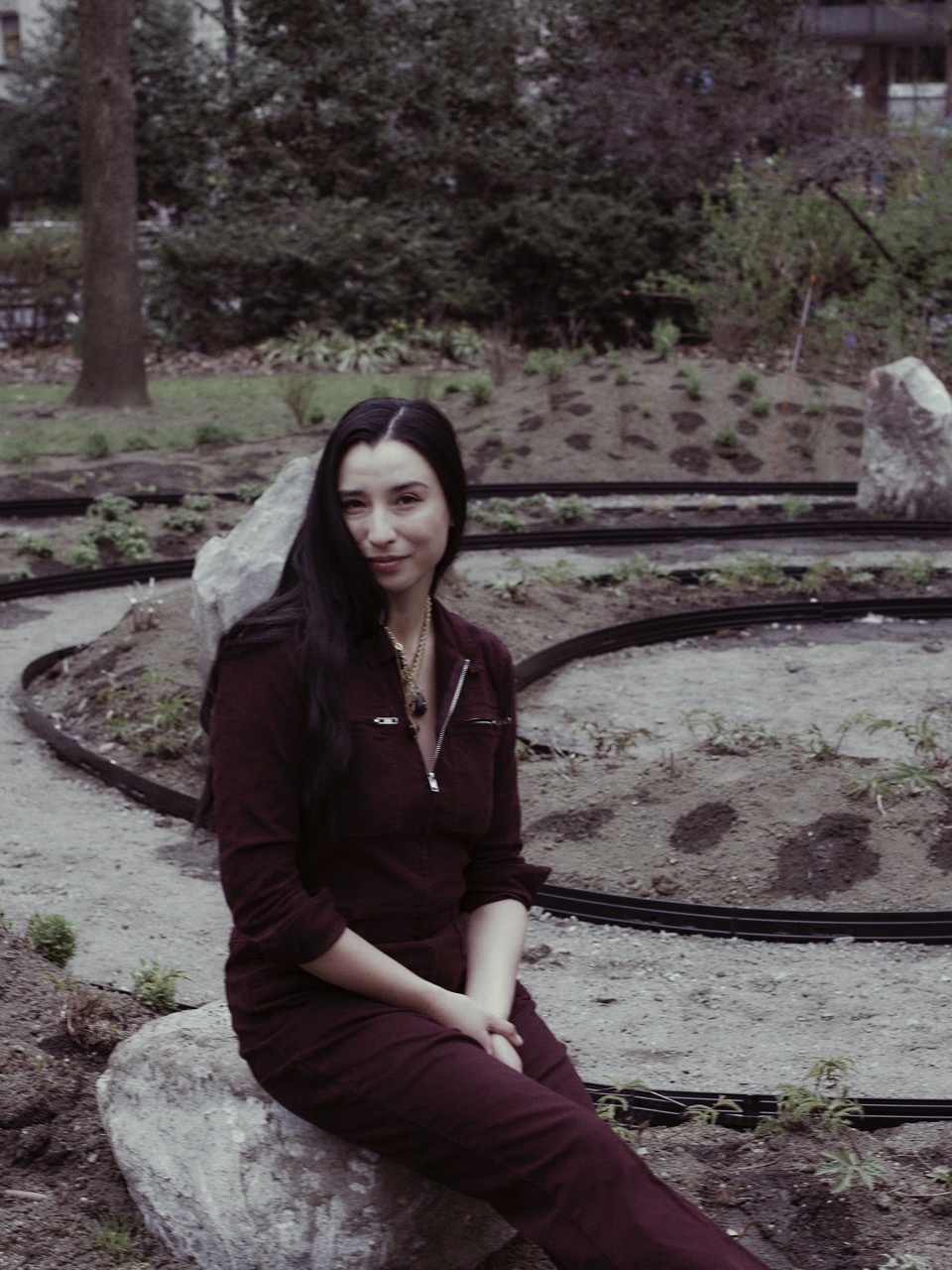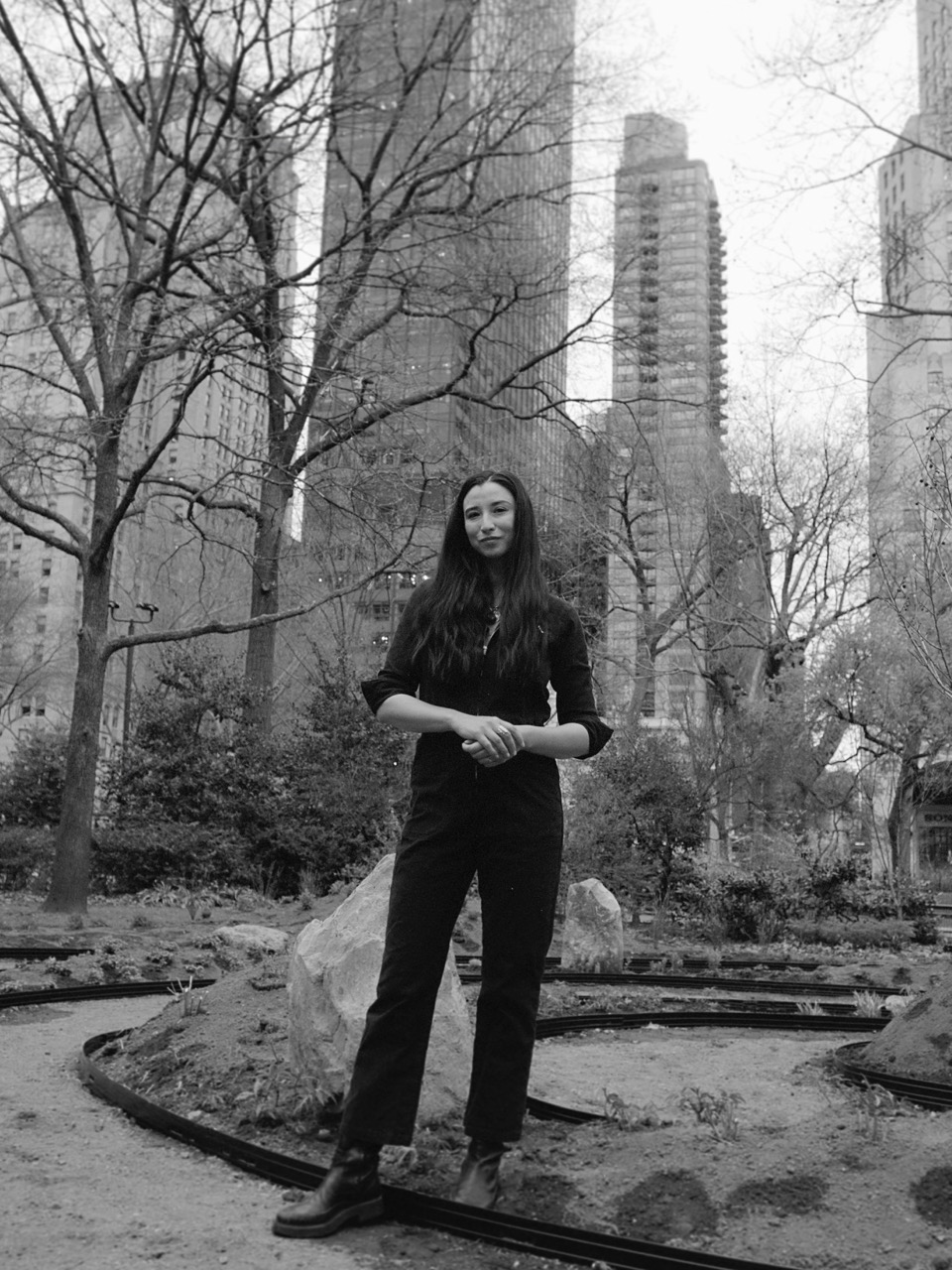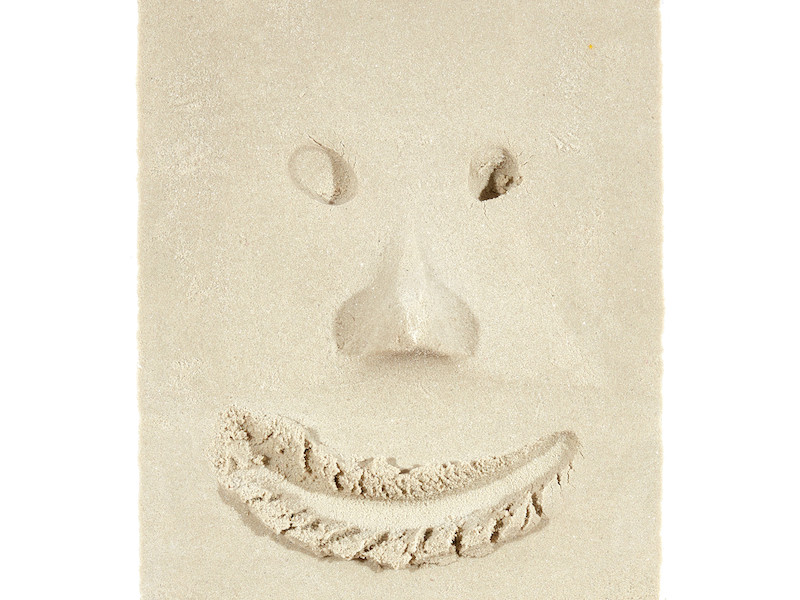Can't Keep Sweet
That image, in a weird way, then reminded Marshall of Versace’s iconic Fall/Winter campaign from 1994, in which supermodels including Cindy Crawford, Claudia Schiffer, Stephanie Seymour and Christy Turlington, posed in their own long-sleeve pastels. While the similarities between the two images may be tenuous, their contrast is stark: in the Versace photo, the women are powerful, sexy, unguarded—the queens of their own reality— and their clothes are just one manifestation of their unencumbered force. In Warren’s, the women look small, their smiles either disguising their fear or serving as proof of their blind faith, their garments a reminder of their mandated modesty and utter lack of free will.
That dichotomy, and the empathy she felt for the women in the FLDS community, became the inspiration for Marshall’s latest series, Not Vice/Versa. In it, the artist wears traditional FLDS dresses and temple garments while mimicking the models in the Versace ad, her goal being to raise awareness about the widespread abuses within the community. As part of her research, she met former FLDS member Sarah Allred, and Tonia Tewell, the founder of Holding Out HELP, a non-profit in Utah that helps those trying to leave polygamist communities. Allred, who was married to a polygamist at 18 and had her seven children taken away from her before being excommunicated nearly seven years ago, became one of the many voices Marshall hoped to amplify through her project, the title of which emphasizes “individuality of expression over conformity,” she says. “I am not just another face in the crowd, I am not easily replaced with another wife, I am not interchangeable as a woman. I am a woman with rights, and not vice versa.”
Andrea Mary Marshall—What was your life like in the FLDS?
Sarah Allred—Women were there to serve their husbands and to have children—I had known that since I was young. But when Warren Jeffs came into power, that’s when they really started telling us the details of what we should wear, when we should wake up, what we should pray for, what we should eat— basically controlling our whole lives.in the wrong way. I think that’s why a lot of women just don’t speak. With me, it felt like my kids were how they controlled me, because if you don’t conform to everything that’s required of you, then your children will get taken away.
AM—Which is what they did to you, right?
SA—Yes, they did before I finally left. They had been taken away from me six times, and each time they were taken away, it was anywhere from six months to two years. But it was for no reason, except for that they felt like they couldn’t control me anymore.
Tonia Tewell—Or they said you were not fit to be a mother, which is what they told a lot of my other clients, as well.
SA—Yeah, that’s ultimately what they told me. That, and that my children were meant for greatness and that I wasn’t worthy to raise them.
AM—Were there certain things you did that made them start to take your kids away, or did they do it just to exert their control?
SA—To exert their control. I remember most of the time, I was so baffled—I didn’t understand what I had done or if I had even done anything. Sometimes you were given a reason, sometimes you weren’t. Most of the time, though, I was told, “You have to suffer because somebody has to atone for the disunity in the family,” and I was the one that was always chosen for that. One day you were in good standing and happily doing everything you were told, and then the next minute, you’re in a vehicle in the night getting hauled somewhere and left without a phone, or vehicle, or any way to contact anyone. There was usually a man that was supposedly there to make sure you had the food you needed—they were called ‘caregivers,’ but they were really just there to make sure that you were doing what you’re supposed to, and to report back to Warren or my husband. I didn’t know how much abuse it was until now, really.
AM—With so much psychological, physical and sexual abuse in the community, why do you think so many women have stayed?
SA—Because they don’t realize how strong they are, because their whole lives they were told that they were weak, that they didn’t matter, that they had to have a man control them to survive and take them to heaven, and that you couldn’t get to God without going through a man. You have everything taken away from you—not only physically, but mentally. Call me a feminist or whatever, but I believe the reason why men work so hard to control women, is because women are so powerful. We would rule the world if all of us knew it. And men can’t afford for that to happen.
AM—What changed for you? What was the moment you realized how strong you are? What created that power in you, and your decision to leave?
SA—I was actually kicked out, and told I wasn’t worthy to be a mom and that I wasn’t worthy to be in the community, so they no longer had any use for me. I’m glad now, because my greatest trial became my greatest blessing. But at the time, it wasn’t my choice and it took me a couple of years of hell to actually get over it.
AM—After you left?
SA—Yes. I was still so brainwashed. It wasn’t until I was gone for two years that I took off my underwear, unplugged the recorded readings and Warren Jeffs’ teachings and just stopped. It was like an addiction or something—it was like he was plugged into your head at all times, so you didn’t know what your heart was telling you, and even if you did, you didn’t dare listen to it. For me, it was like an ‘aha’ moment, where I wasn’t going to take this crap anymore. I could either die of a broken heart, or loneliness, and let them win, or I could stand up. I saw around the world that women were being powerful and it was very inspiring for me. office—Why did they kick you out?
SA—My oldest daughter was being groomed for Warren Jeffs, and I realized that when he went to prison. Going back to when she was a young girl, his whole family—everyone—just knew that she belonged to him. But when she was six years old, Warren got taken to prison, and I just happened to be in a place that I wasn’t supposed to, where I saw something I wasn’t supposed to see, and I realized that Warren Jeffs’ wives had been taking young girls from different families and grooming them for him. That night, I had a nightmare and woke up, and wrote a letter to Warren. I told him I would never condone that. Ultimately, I believe that the rebellion I showed is why they wanted me to leave. So, they accused me of child murder. We were always told the only way we could lose our place in heaven is if we murdered someone. So, they started telling women who had miscarriages, or even used birth control, that they were murdering their children, even though I hadn’t even had a miscarriage. Part of why I started writing my book was because I wanted to leave a legacy for my children about each fight I went through to have each of them here today, including that accusation. After they kicked me out, they told my kids that I had tried to abort them, and when that didn’t work, I tried to kill them. That was probably the hardest thing I had to deal with—because my children were turned against me.
AM—Let’s talk about the clothes. I know there are four to five layers of undergarments underneath the dresses, and I can imagine that would be very uncomfortable, especially in Utah, with the heat and everything. How did you feel about it?
SA—It was just the only thing I knew how to wear. But it did get stricter and stricter, to the point where they would choose even the fabric that we could use and styles we could have. I mean, I wore underwear that was one piece that covered up my entire body except for my hands and feet, all the way up to my neck. That was originally called a temple garment, but they put it into effect so that women had to wear them all the time. We also had to wear a slip that did not fit the form, and panties that were full-figured, meaning they had to fully cover up your body so you couldn’t see any skin, even if you didn’t have a dress on. And of course we had to wear a bra, but it got to the point where the bras had to be specially made—they couldn’t be made by the church. We had to wear like, four layers of clothing every day.


AM—What education did you receive in the community? What were you taught about the outside world?
SA—We were taught that the outside world was wicked—that they would harm us. We were taught to fear it in every way. When I was growing up, we could freely go shopping, and went to fairs, and carnivals, and to the lagoon. But as we got older, partaking in anything of the outside world made it so you were not in good standing. It got to the point where you could not even step foot in the outside world, wear any clothes, or eat any foods that were made or processed outside of the community. It got so bad that they said if you were to even walk into a store and glance at newspapers or tabloids or whatever, the devil would take over your mind and body, and you would be excommunicated. They told us in church about a man who read the front page of a news article and got his family taken away.
AM—This was around the time Warren was in trouble and on the run, so he didn’t want anybody to see what was happening.
SA—Exactly. We didn’t even know at the time what Warren was being prosecuted for. We were just told that it was religious persecution—that it was the devil trying to halt God’s work.
AM—When he was eventually arrested, didn’t he blame the community? For not being faithful or holy enough?
SA—Yeah, we were told that he was in prison because of our lack of faith. He blamed everybody else. So, you had people starving themselves, fasting in prayer. He would have days—even up to a week at a time—where he would call on a fast for him to be delivered, because things were getting so bad and it was up to us to deliver him. It was such a mind game. But he not only got more powerful, he got even meaner. Because he was suffering, he was going to make sure that the rest of us were suffering, as well.
AM—There’s this phrase, ‘keep sweet,’ that he made his kind of mantra, pertaining to the idea of everyone living in perfect harmony. But what did that phrase imply for women in the community?
SA—You just couldn’t express yourself, you couldn’t speak your mind. So, I just trained myself to not even know how I felt about things. ‘Keep sweet’ meant you couldn’t let yourself get irritated, or upset, and you couldn’t feel angry about anything.
AM—I also read that people in the community are often denied medical treatment. Is that true?
SA—Yes, partially. You were deemed as not having enough faith— you were treated like you were possessed by the devil because you had a sickness. Or if you were a mother and had a child that was sick, you did not exert enough faith for them to be healed, so you were not a good mother. I had a daughter who would often get really sick with high fevers of 105 degrees. I didn’t know what was wrong, so I called the ambulance once and got reprimanded for it. They sent the ambulance home, and sent a group of men over, then they just prayed for her, and in their prayers, it was just about fixing the mother’s faith so she could be healed. But there’s so much more to the story. I eventually, rebelling to the consequences of getting punished, got her tested, and she had one kidney that had stopped functioning, it was killing her other kidney. Because I went and had them take care of her with surgery to remove the kidney, I was called rebellious and got shunned. I also got my other children taken away, and received a message from Warren Jeffs that I was of the devil, because I didn’t lean on my own Heavenly Father for my child to be healed.
AM—Did you have anyone you could confide in?
SA—I kept it all in, because that was the way that it would always come back and bite you. My half-sister, I would kind of confide in her, because she was the person I trusted most. But even then, I wouldn’t really dare, because I was afraid that I would get in trouble for feeling that way or she would be ashamed of me—that I wasn’t as perfect as everyone expected or wanted me to be. And being a sister-wife to Warren Jeffs’ daughter wasn’t all peaches and cream, let me tell you. That was probably one of the biggest things.
AM—What was it like with the other sister-wives?
SA—Each one of them had their different things, their different personalities that they brought to the table. But we just knew that we had to live in peace and harmony or we wouldn’t. I’ll give you one example: I got pregnant with my third child and was put on bed rest. I could hear my three-year-old in the other room, and another one of the sister-wives was being really rough with her, yelling at her. So I called her to me and took her into my room, and I suffered because of it. When my husband got home and learned that I had stood up for my child against another mother, he didn’t let my children come into my room for a while, and told me that if I did it again, then he would have me go stay somewhere else where I wouldn’t see my children until after I had the baby. That was the first time that I realized my voice as a wife and mother didn’t matter, and that I couldn’t protect my children.
AM—What have been the greatest challenges you’ve faced since leaving?
SA—Oh there were so many. My self-worth, seeing myself as the person that I am instead of the person they told me I was, was really hard, and I still have to remind myself every day that I am beautiful, I am smart, I am powerful and that I’m a good mom. It’s just something I have to do, and if I forget, I fall right back into thinking, ‘Can I really do this? What made me think I could be a single mom with seven kids? That I could take my children out of there, and just live in the world without being taught how?’ It’s a constant thing, and I just have to remind myself how much I’ve gone through.
AM—Do you talk to anybody, like friends or family, that are still there?
SA—Once you’re no longer part of the community, they will never talk to you again, unless they also decide to leave. I hadn’t seen my mom for seven years, then we bumped into her at a public place and she ignored me. She wouldn’t even acknowledge me, and ran the other way.
AM—How has your relationship to religion and spirituality changed?
SA—It has changed immensely. It’s really hard to separate God from religion for me, and it’s really hard to separate Warren from God. So, we have pretty much just put that on a shelf for now. I mean, I believe there is a higher power, and I know that I am spiritual, but I am not religious at all. I believe that we have in ourselves the power to do anything.
AM—What about your self-perception? What sort of clothing choices do you make for yourself now that you’re free of that repression?
SA—I wish I had the body I had when I was there, so I could show it off! I personally couldn’t start showing skin right away, but now I believe that everybody should wear whatever they feel comfortable wearing, and do whatever they feel comfortable doing. I think that’s what really matters—to be comfortable with yourself, to love yourself, to be who you are. It took me a long time to be able to look in the mirror and put on makeup—I would feel so guilty for being so vain. I know now that it’s not shameful, but it was really hard to get there.
AM—What about your hair? When you finally cut it, two years later, how did it feel?
SA—Oh my goodness, when I got my hair cut off, that was actually the most freeing. I don’t understand why or how, but that was truly when I let myself go. It was almost like that was the last tie to my husband, and when I cut it off, it was, metaphorically speaking, like when you give birth and the umbilical cord is cut—the feeling of that snip is how I felt when I finally cut it.
AM—Now that you have access to pop culture, do you have a favorite book or movie? What kind of music do you listen to?
SA—We are a wild family. We like pop, and all different types of music, and we watch whatever is on television. I don’t feel any remnants of the FLDS anymore, and I don’t hold onto any of the belief systems—I just do what I feel good about doing. But listening to music, just turning on the radio, that was so healing for me, just to let my mind go and turn on Taylor Swift or Sara Bareilles. When you’re in it, your mind is so buttoned up that you can’t ever just let go. So, to be able to move my body and dance, that was and still is something that I am self-conscious about doing. But I feel like doing that is what is freeing.
O—Did you ever imagine you could have the life that you do now?
SA—I never imagined it at all, but I knew that there was a big, beautiful world outside. I can admit that now, but back then, I was so ashamed to even say that I thought about it. But I wanted to—I wanted to put on lipstick, and earrings, and wear shorts. I wanted to be a gentile, because I felt like they were just so free and happy. Of course, we were told that it was all a lie and just a way to convince us to leave God, and that if we did, the devil would take over and we would never be happy. Some part of you knows that’s not true, yet you don’t know for sure. How could you? And it’s scary, especially for women to go out and find out if they can survive it.
AM—What would you tell women who are thinking of leaving the FLDS?
SA—I’d just say, “We got this, bitches.” I’m just joking. That’s a loaded question. But if I’ve lived through the things I’ve lived through, anyone can. It’s the fear that holds us back.
AM—What about your daughters—what advice do you give them?
SA—I give my daughters lots of advice, but the biggest gifts I can give to them is teaching them that they have to love and be powerful within themselves before they can lean on anyone else. Sometimes I get afraid of offending people, but the truth is, I don’t like men very much, because I haven’t seen a whole lot that impress me. So, I don’t want my daughters to ever feel like they have to rely on a man. And I want them to listen to their hearts, because your own heart will never lead you astray.
AM—Are there any misconceptions about the FLDS community? We really only hear what the media tells us.
SA—I’m my own person—the FLDS does not define me—and one of the hardest things for me, is to be put in a box with the FLDS, because each person there is just like you, their own person. And I just believe that everybody should have a chance to be themselves and not be defined by anything, let alone the FLDS. The truth is, there are some extremely strong, beautiful women there—they just don’t know it yet. But when they unlock those chains, watch out.
O—What do you want people to take away from your story?
SA—There is strength within us. I claimed my power, but I survived by realizing every day that I can do this. I believe that because of the path I walked, I was nothing. I had everything taken away from me—physically, mentally and spiritually—and I would never imagine being able to live to tell the tale. That’s what I feel passionate about: that oh my goodness, I lived to tell this tale, and I share my story because of how I have been inspired by people who have gone through suffering and pushed through it. While we’re all different, the experiences we have, the demons we have, the dark paths we have—we all have our things that make life hard, but if we just keep going, there’s bound to be something. I never imagined I would ever see my kids again, but now we are just a beautiful, crazy family. —END
